
LocalAI
:robot: The free, Open Source alternative to OpenAI, Claude and others. Self-hosted and local-first. Drop-in replacement, running on consumer-grade hardware. No GPU required. Runs gguf, transformers, diffusers and many more. Features: Generate Text, MCP, Audio, Video, Images, Voice Cloning, Distributed, P2P and decentralized inference
Stars: 42977

LocalAI is a free and open-source OpenAI alternative that acts as a drop-in replacement REST API compatible with OpenAI (Elevenlabs, Anthropic, etc.) API specifications for local AI inferencing. It allows users to run LLMs, generate images, audio, and more locally or on-premises with consumer-grade hardware, supporting multiple model families and not requiring a GPU. LocalAI offers features such as text generation with GPTs, text-to-audio, audio-to-text transcription, image generation with stable diffusion, OpenAI functions, embeddings generation for vector databases, constrained grammars, downloading models directly from Huggingface, and a Vision API. It provides a detailed step-by-step introduction in its Getting Started guide and supports community integrations such as custom containers, WebUIs, model galleries, and various bots for Discord, Slack, and Telegram. LocalAI also offers resources like an LLM fine-tuning guide, instructions for local building and Kubernetes installation, projects integrating LocalAI, and a how-tos section curated by the community. It encourages users to cite the repository when utilizing it in downstream projects and acknowledges the contributions of various software from the community.
README:
💡 Get help - ❓FAQ 💭Discussions 💬 Discord 📖 Documentation website
💻 Quickstart 🖼️ Models 🚀 Roadmap 🛫 Examples Try on
LocalAI is the free, Open Source OpenAI alternative. LocalAI act as a drop-in replacement REST API that's compatible with OpenAI (Elevenlabs, Anthropic... ) API specifications for local AI inferencing. It allows you to run LLMs, generate images, audio (and not only) locally or on-prem with consumer grade hardware, supporting multiple model families. Does not require GPU. It is created and maintained by Ettore Di Giacinto.
Liking LocalAI? LocalAI is part of an integrated suite of AI infrastructure tools, you might also like:
- LocalAGI - AI agent orchestration platform with OpenAI Responses API compatibility and advanced agentic capabilities
- LocalRecall - MCP/REST API knowledge base system providing persistent memory and storage for AI agents
- 🆕 Cogito - Go library for building intelligent, co-operative agentic software and LLM-powered workflows, focusing on improving results for small, open source language models that scales to any LLM. Powers LocalAGI and LocalAI MCP/Agentic capabilities
- 🆕 Wiz - Terminal-based AI agent accessible via Ctrl+Space keybinding. Portable, local-LLM friendly shell assistant with TUI/CLI modes, tool execution with approval, MCP protocol support, and multi-shell compatibility (zsh, bash, fish)
- 🆕 SkillServer - Simple, centralized skills database for AI agents via MCP. Manages skills as Markdown files with MCP server integration, web UI for editing, Git synchronization, and full-text search capabilities
| Talk Interface | Generate Audio |
|---|---|
 |
 |
| Models Overview | Generate Images |
|---|---|
 |
 |
| Chat Interface | Home |
|---|---|
 |
 |
| Login | Swarm |
|---|---|
 |
 |
⚠️ Note: Theinstall.shscript is currently experiencing issues due to the heavy changes currently undergoing in LocalAI and may produce broken or misconfigured installations. Please use Docker installation (see below) or manual binary installation until issue #8032 is resolved.
Run the installer script:
# Basic installation
curl https://localai.io/install.sh | shFor more installation options, see Installer Options.

Note: the DMGs are not signed by Apple as quarantined. See https://github.com/mudler/LocalAI/issues/6268 for a workaround, fix is tracked here: https://github.com/mudler/LocalAI/issues/6244
💡 Docker Run vs Docker Start
docker runcreates and starts a new container. If a container with the same name already exists, this command will fail.docker startstarts an existing container that was previously created withdocker run.If you've already run LocalAI before and want to start it again, use:
docker start -i local-ai
docker run -ti --name local-ai -p 8080:8080 localai/localai:latest# CUDA 13.0
docker run -ti --name local-ai -p 8080:8080 --gpus all localai/localai:latest-gpu-nvidia-cuda-13
# CUDA 12.0
docker run -ti --name local-ai -p 8080:8080 --gpus all localai/localai:latest-gpu-nvidia-cuda-12
# NVIDIA Jetson (L4T) ARM64
# CUDA 12 (for Nvidia AGX Orin and similar platforms)
docker run -ti --name local-ai -p 8080:8080 --gpus all localai/localai:latest-nvidia-l4t-arm64
# CUDA 13 (for Nvidia DGX Spark)
docker run -ti --name local-ai -p 8080:8080 --gpus all localai/localai:latest-nvidia-l4t-arm64-cuda-13docker run -ti --name local-ai -p 8080:8080 --device=/dev/kfd --device=/dev/dri --group-add=video localai/localai:latest-gpu-hipblasdocker run -ti --name local-ai -p 8080:8080 --device=/dev/dri/card1 --device=/dev/dri/renderD128 localai/localai:latest-gpu-inteldocker run -ti --name local-ai -p 8080:8080 localai/localai:latest-gpu-vulkan# CPU version
docker run -ti --name local-ai -p 8080:8080 localai/localai:latest-aio-cpu
# NVIDIA CUDA 13 version
docker run -ti --name local-ai -p 8080:8080 --gpus all localai/localai:latest-aio-gpu-nvidia-cuda-13
# NVIDIA CUDA 12 version
docker run -ti --name local-ai -p 8080:8080 --gpus all localai/localai:latest-aio-gpu-nvidia-cuda-12
# Intel GPU version
docker run -ti --name local-ai -p 8080:8080 localai/localai:latest-aio-gpu-intel
# AMD GPU version
docker run -ti --name local-ai -p 8080:8080 --device=/dev/kfd --device=/dev/dri --group-add=video localai/localai:latest-aio-gpu-hipblasFor more information about the AIO images and pre-downloaded models, see Container Documentation.
To load models:
# From the model gallery (see available models with `local-ai models list`, in the WebUI from the model tab, or visiting https://models.localai.io)
local-ai run llama-3.2-1b-instruct:q4_k_m
# Start LocalAI with the phi-2 model directly from huggingface
local-ai run huggingface://TheBloke/phi-2-GGUF/phi-2.Q8_0.gguf
# Install and run a model from the Ollama OCI registry
local-ai run ollama://gemma:2b
# Run a model from a configuration file
local-ai run https://gist.githubusercontent.com/.../phi-2.yaml
# Install and run a model from a standard OCI registry (e.g., Docker Hub)
local-ai run oci://localai/phi-2:latest⚡ Automatic Backend Detection: When you install models from the gallery or YAML files, LocalAI automatically detects your system's GPU capabilities (NVIDIA, AMD, Intel) and downloads the appropriate backend. For advanced configuration options, see GPU Acceleration.
For more information, see 💻 Getting started, if you are interested in our roadmap items and future enhancements, you can see the Issues labeled as Roadmap here
- February 2026: Realtime API for audio-to-audio with tool calling, ACE-Step 1.5 support
- January 2026: LocalAI 3.10.0 - Major release with Anthropic API support, Open Responses API for stateful agents, video & image generation suite (LTX-2), unified GPU backends, tool streaming & XML parsing, system-aware backend gallery, crash fixes for AVX-only CPUs and AMD VRAM reporting, request tracing, and new backends: Moonshine (ultra-fast transcription), Pocket-TTS (lightweight TTS). Vulkan arm64 builds now available. Release notes.
- December 2025: Dynamic Memory Resource reclaimer, Automatic fitting of models to multiple GPUS(llama.cpp), Added Vibevoice backend
- November 2025: Major improvements to the UX. Among these: Import models via URL and Multiple chats and history
- October 2025: 🔌 Model Context Protocol (MCP) support added for agentic capabilities with external tools
- September 2025: New Launcher application for MacOS and Linux, extended support to many backends for Mac and Nvidia L4T devices. Models: Added MLX-Audio, WAN 2.2. WebUI improvements and Python-based backends now ships portable python environments.
- August 2025: MLX, MLX-VLM, Diffusers and llama.cpp are now supported on Mac M1/M2/M3+ chips ( with
developmentsuffix in the gallery ): https://github.com/mudler/LocalAI/pull/6049 https://github.com/mudler/LocalAI/pull/6119 https://github.com/mudler/LocalAI/pull/6121 https://github.com/mudler/LocalAI/pull/6060 - July/August 2025: 🔍 Object Detection added to the API featuring rf-detr
- July 2025: All backends migrated outside of the main binary. LocalAI is now more lightweight, small, and automatically downloads the required backend to run the model. Read the release notes
- June 2025: Backend management has been added. Attention: extras images are going to be deprecated from the next release! Read the backend management PR.
- May 2025: Audio input and Reranking in llama.cpp backend, Realtime API, Support to Gemma, SmollVLM, and more multimodal models (available in the gallery).
- May 2025: Important: image name changes See release
- Apr 2025: Rebrand, WebUI enhancements
- Apr 2025: LocalAGI and LocalRecall join the LocalAI family stack.
- Apr 2025: WebUI overhaul, AIO images updates
- Feb 2025: Backend cleanup, Breaking changes, new backends (kokoro, OutelTTS, faster-whisper), Nvidia L4T images
- Jan 2025: LocalAI model release: https://huggingface.co/mudler/LocalAI-functioncall-phi-4-v0.3, SANA support in diffusers: https://github.com/mudler/LocalAI/pull/4603
- Dec 2024: stablediffusion.cpp backend (ggml) added ( https://github.com/mudler/LocalAI/pull/4289 )
- Nov 2024: Bark.cpp backend added ( https://github.com/mudler/LocalAI/pull/4287 )
- Nov 2024: Voice activity detection models (VAD) added to the API: https://github.com/mudler/LocalAI/pull/4204
- Oct 2024: examples moved to LocalAI-examples
- Aug 2024: 🆕 FLUX-1, P2P Explorer
- July 2024: 🔥🔥 🆕 P2P Dashboard, LocalAI Federated mode and AI Swarms: https://github.com/mudler/LocalAI/pull/2723. P2P Global community pools: https://github.com/mudler/LocalAI/issues/3113
- May 2024: 🔥🔥 Decentralized P2P llama.cpp: https://github.com/mudler/LocalAI/pull/2343 (peer2peer llama.cpp!) 👉 Docs https://localai.io/features/distribute/
- May 2024: 🔥🔥 Distributed inferencing: https://github.com/mudler/LocalAI/pull/2324
- April 2024: Reranker API: https://github.com/mudler/LocalAI/pull/2121
Roadmap items: List of issues
🚀 Features
- 🧩 Backend Gallery: Install/remove backends on the fly, powered by OCI images — fully customizable and API-driven.
- 📖 Text generation with GPTs (
llama.cpp,transformers,vllm... 📖 and more) - 🗣 Text to Audio
- 🔈 Audio to Text
- 🎨 Image generation
- 🔥 OpenAI-alike tools API
- ⚡ Realtime API (Speech-to-speech)
- 🧠 Embeddings generation for vector databases
- ✍️ Constrained grammars
- 🖼️ Download Models directly from Huggingface
- 🥽 Vision API
- 🔍 Object Detection
- 📈 Reranker API
- 🆕🖧 P2P Inferencing
- 🆕🔌 Model Context Protocol (MCP) - Agentic capabilities with external tools and LocalAGI's Agentic capabilities
- 🔊 Voice activity detection (Silero-VAD support)
- 🌍 Integrated WebUI!
LocalAI supports a comprehensive range of AI backends with multiple acceleration options:
| Backend | Description | Acceleration Support |
|---|---|---|
| llama.cpp | LLM inference in C/C++ | CUDA 12/13, ROCm, Intel SYCL, Vulkan, Metal, CPU |
| vLLM | Fast LLM inference with PagedAttention | CUDA 12/13, ROCm, Intel |
| transformers | HuggingFace transformers framework | CUDA 12/13, ROCm, Intel, CPU |
| MLX | Apple Silicon LLM inference | Metal (M1/M2/M3+) |
| MLX-VLM | Apple Silicon Vision-Language Models | Metal (M1/M2/M3+) |
| Backend | Description | Acceleration Support |
|---|---|---|
| whisper.cpp | OpenAI Whisper in C/C++ | CUDA 12/13, ROCm, Intel SYCL, Vulkan, CPU |
| faster-whisper | Fast Whisper with CTranslate2 | CUDA 12/13, ROCm, Intel, CPU |
| moonshine | Ultra-fast transcription engine for low-end devices | CUDA 12/13, Metal, CPU |
| coqui | Advanced TTS with 1100+ languages | CUDA 12/13, ROCm, Intel, CPU |
| kokoro | Lightweight TTS model | CUDA 12/13, ROCm, Intel, CPU |
| chatterbox | Production-grade TTS | CUDA 12/13, CPU |
| piper | Fast neural TTS system | CPU |
| kitten-tts | Kitten TTS models | CPU |
| silero-vad | Voice Activity Detection | CPU |
| neutts | Text-to-speech with voice cloning | CUDA 12/13, ROCm, CPU |
| vibevoice | Real-time TTS with voice cloning | CUDA 12/13, ROCm, Intel, CPU |
| pocket-tts | Lightweight CPU-based TTS | CUDA 12/13, ROCm, Intel, CPU |
| qwen-tts | High-quality TTS with custom voice, voice design, and voice cloning | CUDA 12/13, ROCm, Intel, CPU |
| ace-step | Music generation from text descriptions, lyrics, or audio samples | CUDA 12/13, ROCm, Intel, Metal, CPU |
| Backend | Description | Acceleration Support |
|---|---|---|
| stablediffusion.cpp | Stable Diffusion in C/C++ | CUDA 12/13, Intel SYCL, Vulkan, CPU |
| diffusers | HuggingFace diffusion models | CUDA 12/13, ROCm, Intel, Metal, CPU |
| Backend | Description | Acceleration Support |
|---|---|---|
| rfdetr | Real-time object detection | CUDA 12/13, Intel, CPU |
| rerankers | Document reranking API | CUDA 12/13, ROCm, Intel, CPU |
| local-store | Vector database | CPU |
| huggingface | HuggingFace API integration | API-based |
| Acceleration Type | Supported Backends | Hardware Support |
|---|---|---|
| NVIDIA CUDA 12 | All CUDA-compatible backends | Nvidia hardware |
| NVIDIA CUDA 13 | All CUDA-compatible backends | Nvidia hardware |
| AMD ROCm | llama.cpp, whisper, vllm, transformers, diffusers, rerankers, coqui, kokoro, neutts, vibevoice, pocket-tts, qwen-tts, ace-step | AMD Graphics |
| Intel oneAPI | llama.cpp, whisper, stablediffusion, vllm, transformers, diffusers, rfdetr, rerankers, coqui, kokoro, vibevoice, pocket-tts, qwen-tts, ace-step | Intel Arc, Intel iGPUs |
| Apple Metal | llama.cpp, whisper, diffusers, MLX, MLX-VLM, moonshine, ace-step | Apple M1/M2/M3+ |
| Vulkan | llama.cpp, whisper, stablediffusion | Cross-platform GPUs |
| NVIDIA Jetson (CUDA 12) | llama.cpp, whisper, stablediffusion, diffusers, rfdetr, ace-step | ARM64 embedded AI (AGX Orin, etc.) |
| NVIDIA Jetson (CUDA 13) | llama.cpp, whisper, stablediffusion, diffusers, rfdetr | ARM64 embedded AI (DGX Spark) |
| CPU Optimized | All backends | AVX/AVX2/AVX512, quantization support |
Build and deploy custom containers:
WebUIs:
- https://github.com/Jirubizu/localai-admin
- https://github.com/go-skynet/LocalAI-frontend
- QA-Pilot(An interactive chat project that leverages LocalAI LLMs for rapid understanding and navigation of GitHub code repository) https://github.com/reid41/QA-Pilot
Agentic Libraries:
MCPs:
OS Assistant:
- https://github.com/mudler/Keygeist - Keygeist is an AI-powered keyboard operator that listens for key combinations and responds with AI-generated text typed directly into your Linux box.
Model galleries
Voice:
Other:
- Helm chart https://github.com/go-skynet/helm-charts
- VSCode extension https://github.com/badgooooor/localai-vscode-plugin
- Langchain: https://python.langchain.com/docs/integrations/providers/localai/
- Terminal utility https://github.com/djcopley/ShellOracle
- Local Smart assistant https://github.com/mudler/LocalAGI
- Home Assistant https://github.com/sammcj/homeassistant-localai / https://github.com/drndos/hass-openai-custom-conversation / https://github.com/valentinfrlch/ha-gpt4vision
- Discord bot https://github.com/mudler/LocalAGI/tree/main/examples/discord
- Slack bot https://github.com/mudler/LocalAGI/tree/main/examples/slack
- Shell-Pilot(Interact with LLM using LocalAI models via pure shell scripts on your Linux or MacOS system) https://github.com/reid41/shell-pilot
- Telegram bot https://github.com/mudler/LocalAI/tree/master/examples/telegram-bot
- Another Telegram Bot https://github.com/JackBekket/Hellper
- Auto-documentation https://github.com/JackBekket/Reflexia
- Github bot which answer on issues, with code and documentation as context https://github.com/JackBekket/GitHelper
- Github Actions: https://github.com/marketplace/actions/start-localai
- Examples: https://github.com/mudler/LocalAI/tree/master/examples/
- LLM finetuning guide
- How to build locally
- How to install in Kubernetes
- Projects integrating LocalAI
- How tos section (curated by our community)
- Run Visual studio code with LocalAI (SUSE)
- 🆕 Run LocalAI on Jetson Nano Devkit
- Run LocalAI on AWS EKS with Pulumi
- Run LocalAI on AWS
- Create a slackbot for teams and OSS projects that answer to documentation
- LocalAI meets k8sgpt
- Question Answering on Documents locally with LangChain, LocalAI, Chroma, and GPT4All
- Tutorial to use k8sgpt with LocalAI
If you utilize this repository, data in a downstream project, please consider citing it with:
@misc{localai,
author = {Ettore Di Giacinto},
title = {LocalAI: The free, Open source OpenAI alternative},
year = {2023},
publisher = {GitHub},
journal = {GitHub repository},
howpublished = {\url{https://github.com/go-skynet/LocalAI}},
Do you find LocalAI useful?
Support the project by becoming a backer or sponsor. Your logo will show up here with a link to your website.
A huge thank you to our generous sponsors who support this project covering CI expenses, and our Sponsor list:
A special thanks to individual sponsors that contributed to the project, a full list is in Github and buymeacoffee, a special shout out goes to drikster80 for being generous. Thank you everyone!
LocalAI is a community-driven project created by Ettore Di Giacinto.
MIT - Author Ettore Di Giacinto [email protected]
LocalAI couldn't have been built without the help of great software already available from the community. Thank you!
- llama.cpp
- https://github.com/tatsu-lab/stanford_alpaca
- https://github.com/cornelk/llama-go for the initial ideas
- https://github.com/antimatter15/alpaca.cpp
- https://github.com/EdVince/Stable-Diffusion-NCNN
- https://github.com/ggerganov/whisper.cpp
- https://github.com/rhasspy/piper
This is a community project, a special thanks to our contributors! 🤗
For Tasks:
Click tags to check more tools for each tasksFor Jobs:
Alternative AI tools for LocalAI
Similar Open Source Tools

LocalAI
LocalAI is a free and open-source OpenAI alternative that acts as a drop-in replacement REST API compatible with OpenAI (Elevenlabs, Anthropic, etc.) API specifications for local AI inferencing. It allows users to run LLMs, generate images, audio, and more locally or on-premises with consumer-grade hardware, supporting multiple model families and not requiring a GPU. LocalAI offers features such as text generation with GPTs, text-to-audio, audio-to-text transcription, image generation with stable diffusion, OpenAI functions, embeddings generation for vector databases, constrained grammars, downloading models directly from Huggingface, and a Vision API. It provides a detailed step-by-step introduction in its Getting Started guide and supports community integrations such as custom containers, WebUIs, model galleries, and various bots for Discord, Slack, and Telegram. LocalAI also offers resources like an LLM fine-tuning guide, instructions for local building and Kubernetes installation, projects integrating LocalAI, and a how-tos section curated by the community. It encourages users to cite the repository when utilizing it in downstream projects and acknowledges the contributions of various software from the community.
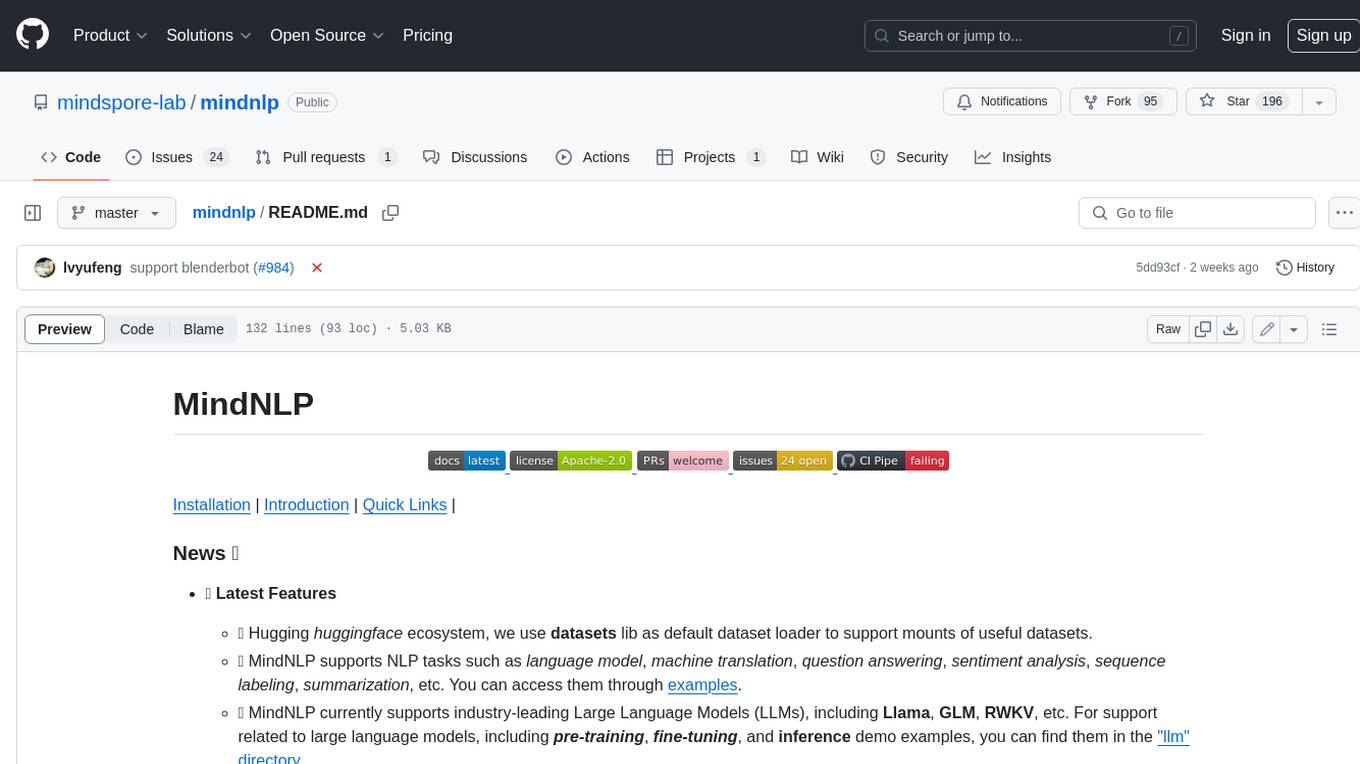
mindnlp
MindNLP is an open-source NLP library based on MindSpore. It provides a platform for solving natural language processing tasks, containing many common approaches in NLP. It can help researchers and developers to construct and train models more conveniently and rapidly. Key features of MindNLP include: * Comprehensive data processing: Several classical NLP datasets are packaged into a friendly module for easy use, such as Multi30k, SQuAD, CoNLL, etc. * Friendly NLP model toolset: MindNLP provides various configurable components. It is friendly to customize models using MindNLP. * Easy-to-use engine: MindNLP simplified complicated training process in MindSpore. It supports Trainer and Evaluator interfaces to train and evaluate models easily. MindNLP supports a wide range of NLP tasks, including: * Language modeling * Machine translation * Question answering * Sentiment analysis * Sequence labeling * Summarization MindNLP also supports industry-leading Large Language Models (LLMs), including Llama, GLM, RWKV, etc. For support related to large language models, including pre-training, fine-tuning, and inference demo examples, you can find them in the "llm" directory. To install MindNLP, you can either install it from Pypi, download the daily build wheel, or install it from source. The installation instructions are provided in the documentation. MindNLP is released under the Apache 2.0 license. If you find this project useful in your research, please consider citing the following paper: @misc{mindnlp2022, title={{MindNLP}: a MindSpore NLP library}, author={MindNLP Contributors}, howpublished = {\url{https://github.com/mindlab-ai/mindnlp}}, year={2022} }
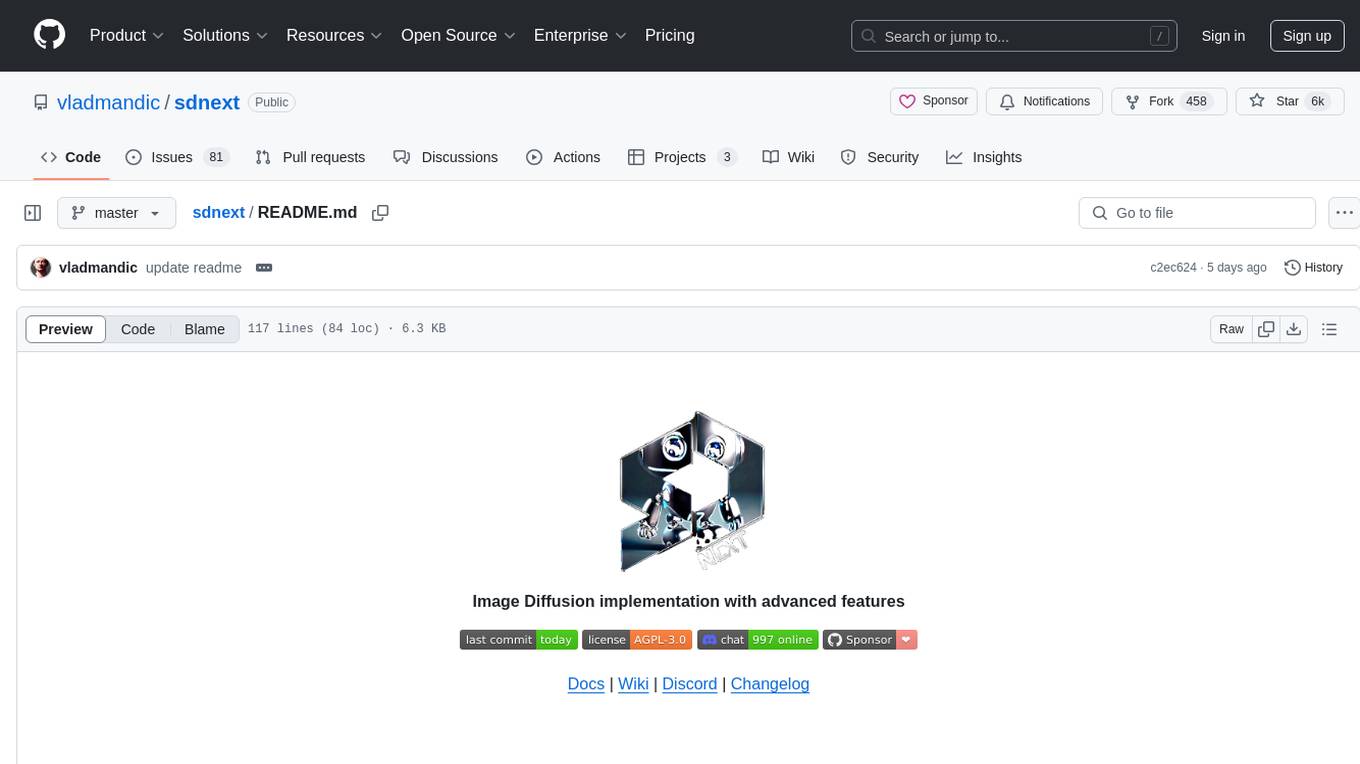
sdnext
SD.Next is an Image Diffusion implementation with advanced features. It offers multiple UI options, diffusion models, and built-in controls for text, image, batch, and video processing. The tool is multiplatform, supporting Windows, Linux, MacOS, nVidia, AMD, IntelArc/IPEX, DirectML, OpenVINO, ONNX+Olive, and ZLUDA. It provides optimized processing with the latest torch developments, including model compile, quantize, and compress functionalities. SD.Next also features Interrogate/Captioning with various models, queue management, automatic updates, and mobile compatibility.
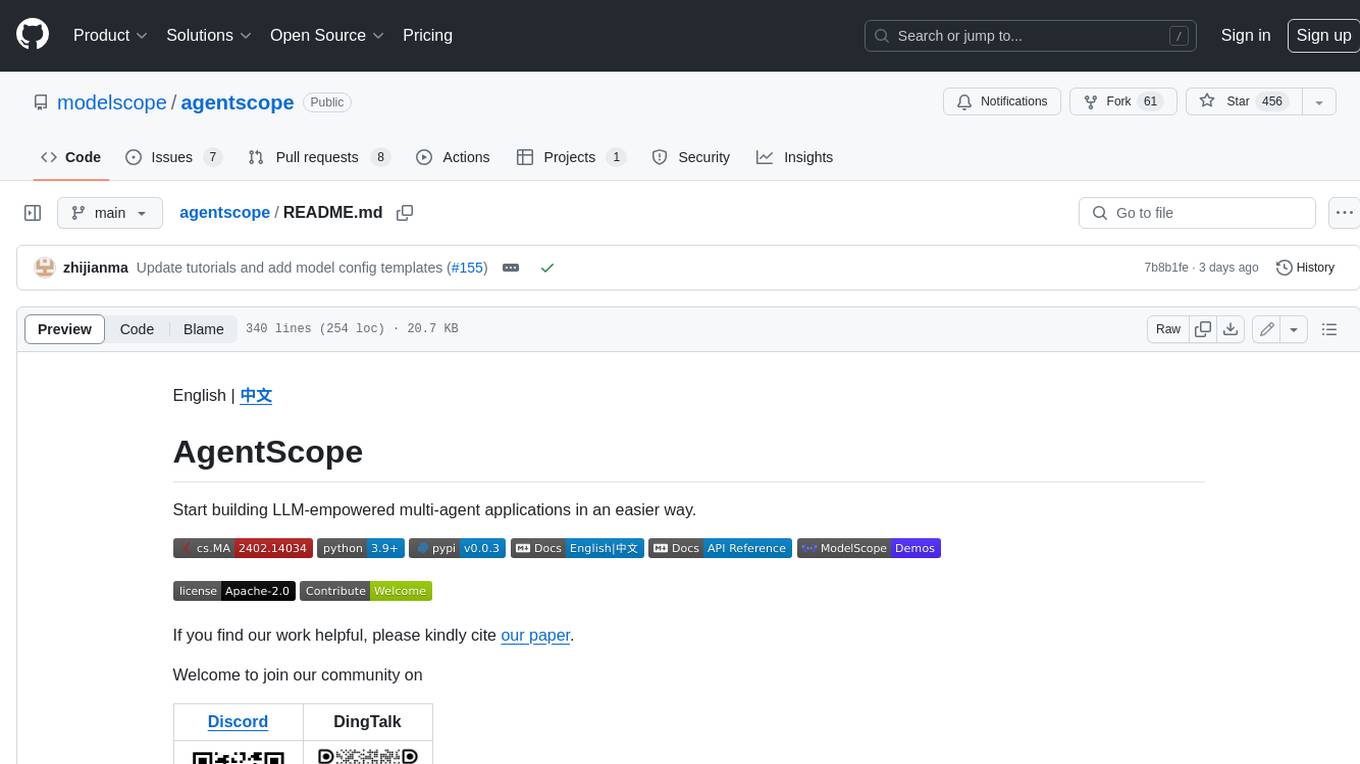
agentscope
AgentScope is a multi-agent platform designed to empower developers to build multi-agent applications with large-scale models. It features three high-level capabilities: Easy-to-Use, High Robustness, and Actor-Based Distribution. AgentScope provides a list of `ModelWrapper` to support both local model services and third-party model APIs, including OpenAI API, DashScope API, Gemini API, and ollama. It also enables developers to rapidly deploy local model services using libraries such as ollama (CPU inference), Flask + Transformers, Flask + ModelScope, FastChat, and vllm. AgentScope supports various services, including Web Search, Data Query, Retrieval, Code Execution, File Operation, and Text Processing. Example applications include Conversation, Game, and Distribution. AgentScope is released under Apache License 2.0 and welcomes contributions.
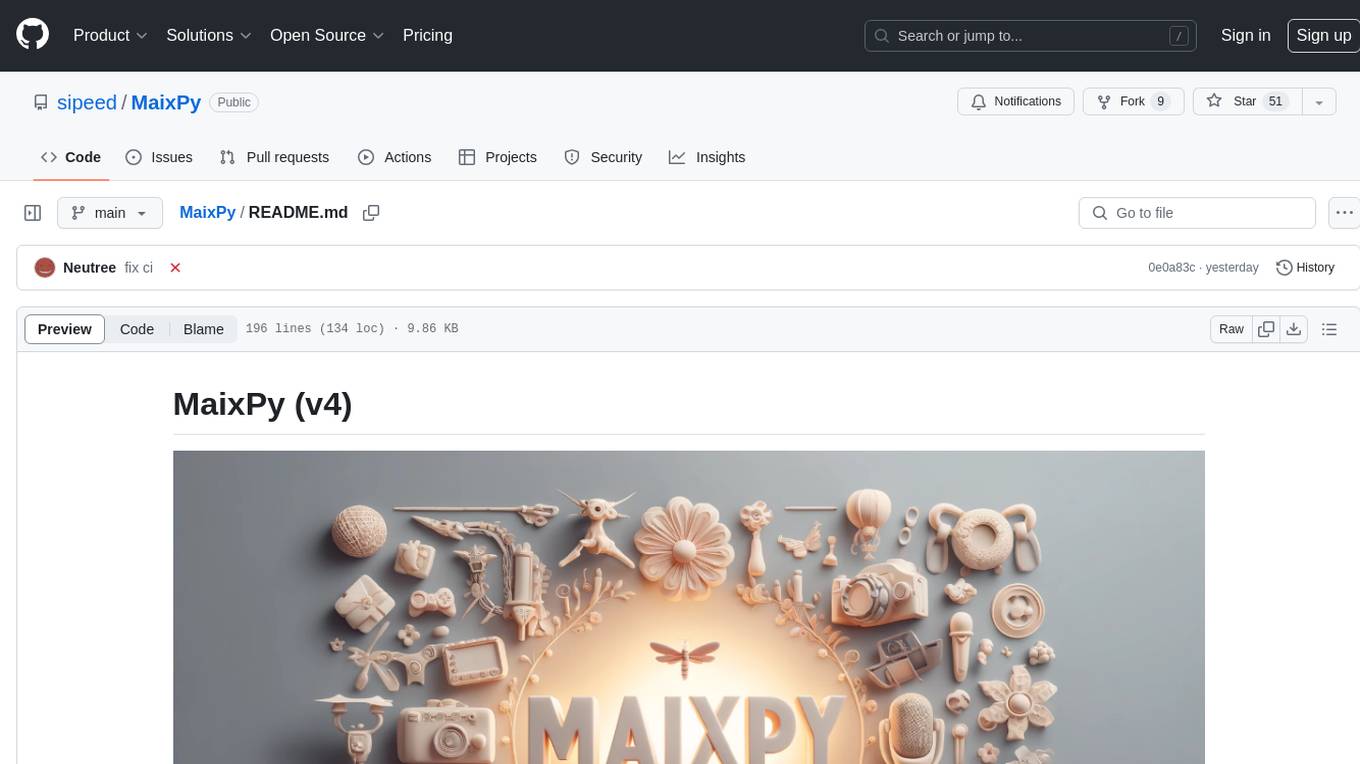
MaixPy
MaixPy is a Python SDK that enables users to easily create AI vision projects on edge devices. It provides a user-friendly API for accessing NPU, making it suitable for AI Algorithm Engineers, STEM teachers, Makers, Engineers, Students, Enterprises, and Contestants. The tool supports Python programming, MaixVision Workstation, AI vision, video streaming, voice recognition, and peripheral usage. It also offers an online AI training platform called MaixHub. MaixPy is designed for new hardware platforms like MaixCAM, offering improved performance and features compared to older versions. The ecosystem includes hardware, software, tools, documentation, and a cloud platform.
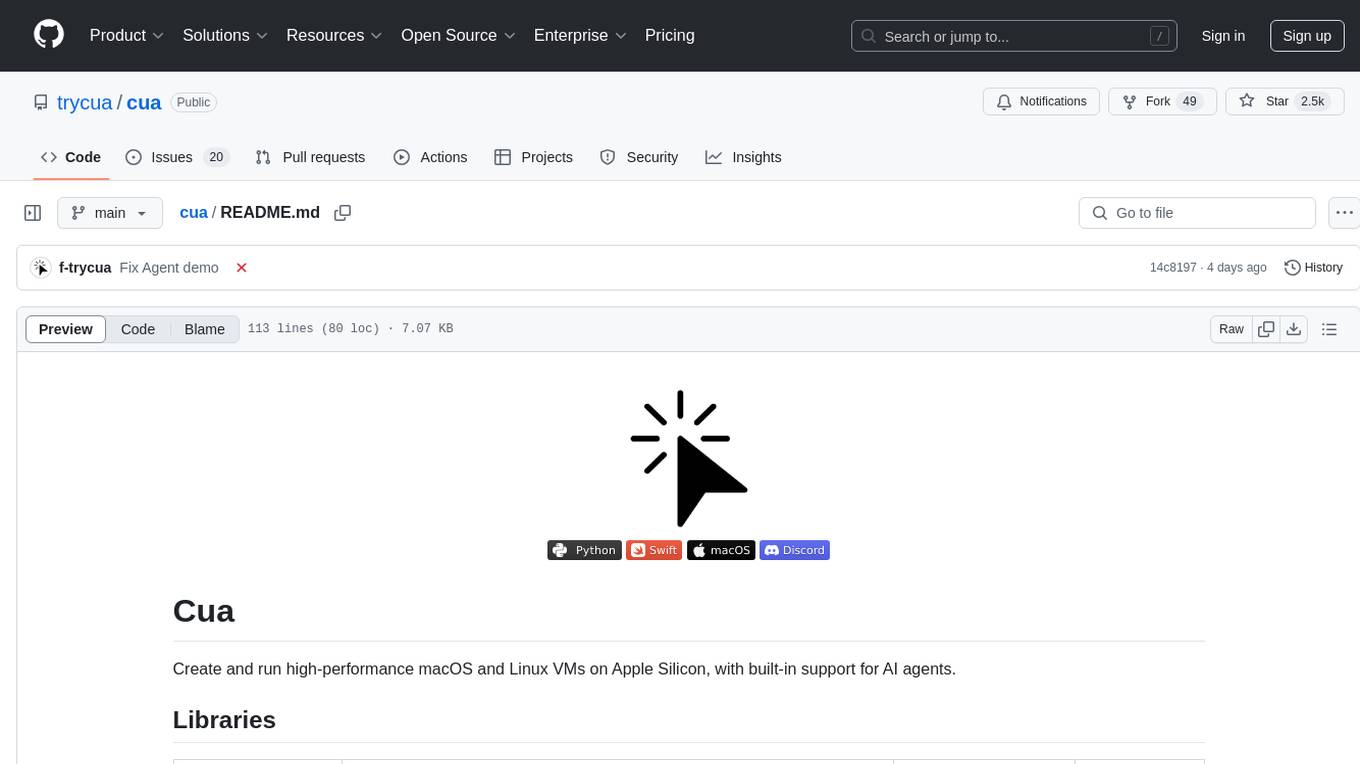
cua
Cua is a tool for creating and running high-performance macOS and Linux virtual machines on Apple Silicon, with built-in support for AI agents. It provides libraries like Lume for running VMs with near-native performance, Computer for interacting with sandboxes, and Agent for running agentic workflows. Users can refer to the documentation for onboarding, explore demos showcasing AI-Gradio and GitHub issue fixing, and utilize accessory libraries like Core, PyLume, Computer Server, and SOM. Contributions are welcome, and the tool is open-sourced under the MIT License.
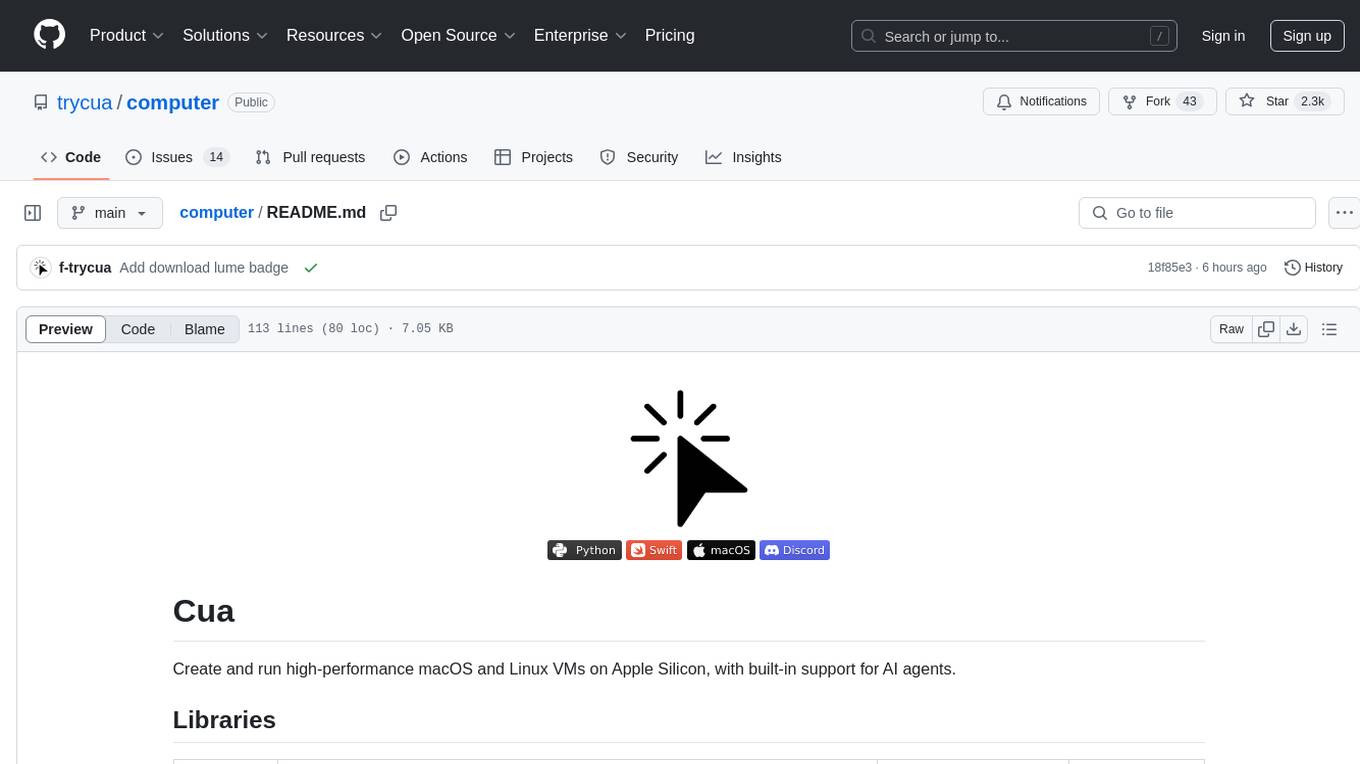
computer
Cua is a tool for creating and running high-performance macOS and Linux VMs on Apple Silicon, with built-in support for AI agents. It provides libraries like Lume for running VMs with near-native performance, Computer for interacting with sandboxes, and Agent for running agentic workflows. Users can refer to the documentation for onboarding and explore demos showcasing the tool's capabilities. Additionally, accessory libraries like Core, PyLume, Computer Server, and SOM offer additional functionality. Contributions to Cua are welcome, and the tool is open-sourced under the MIT License.
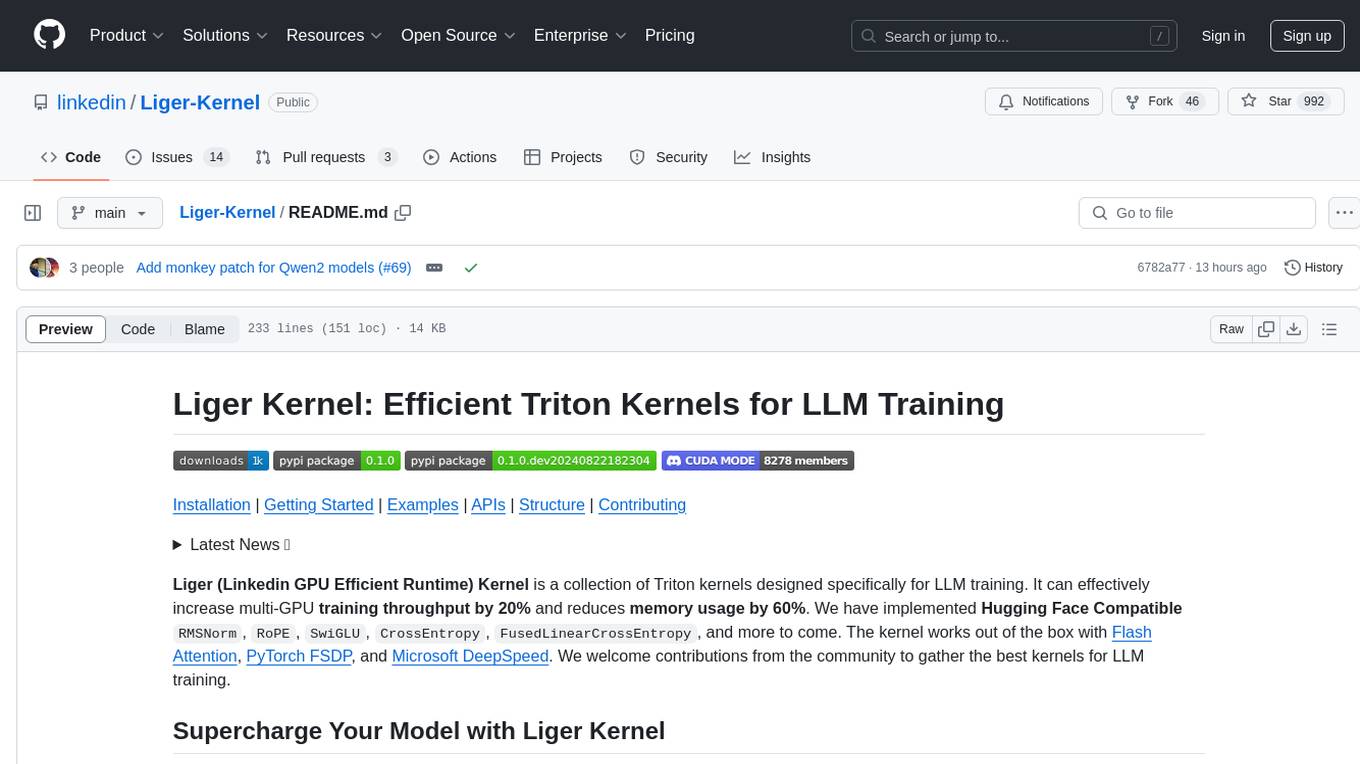
Liger-Kernel
Liger Kernel is a collection of Triton kernels designed for LLM training, increasing training throughput by 20% and reducing memory usage by 60%. It includes Hugging Face Compatible modules like RMSNorm, RoPE, SwiGLU, CrossEntropy, and FusedLinearCrossEntropy. The tool works with Flash Attention, PyTorch FSDP, and Microsoft DeepSpeed, aiming to enhance model efficiency and performance for researchers, ML practitioners, and curious novices.
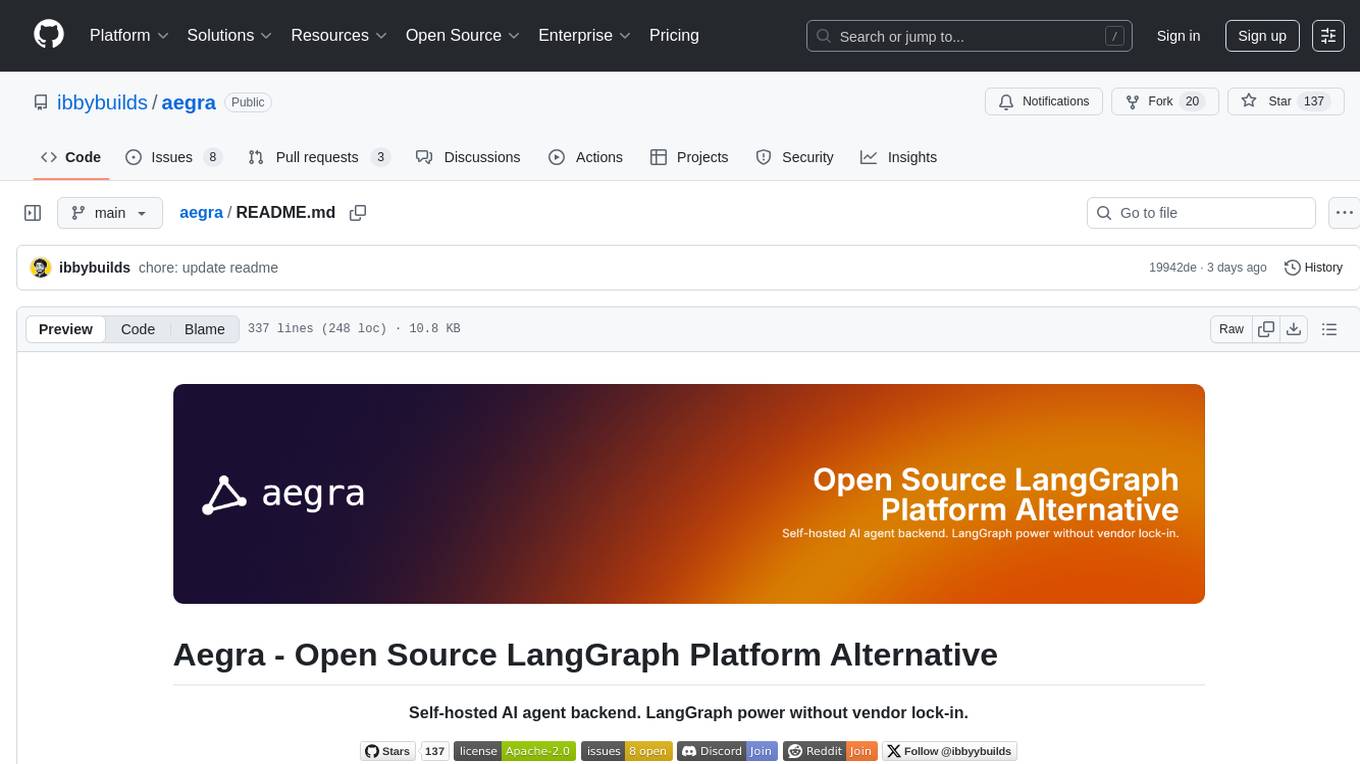
aegra
Aegra is a self-hosted AI agent backend platform that provides LangGraph power without vendor lock-in. Built with FastAPI + PostgreSQL, it offers complete control over agent orchestration for teams looking to escape vendor lock-in, meet data sovereignty requirements, enable custom deployments, and optimize costs. Aegra is Agent Protocol compliant and perfect for teams seeking a free, self-hosted alternative to LangGraph Platform with zero lock-in, full control, and compatibility with existing LangGraph Client SDK.
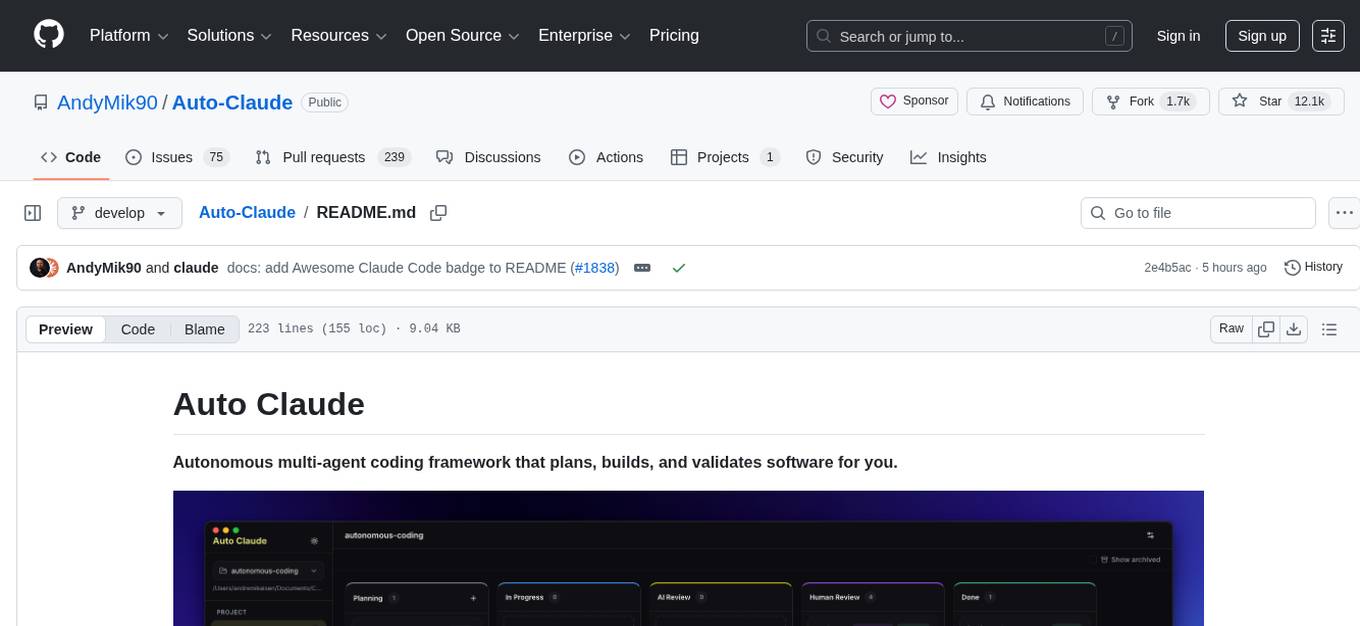
Auto-Claude
Auto Claude is an autonomous multi-agent coding framework that plans, builds, and validates software for users. It provides features such as autonomous tasks handling planning, implementation, and validation, parallel execution with multiple agent terminals, isolated workspaces for safe changes, self-validating quality assurance, AI-powered merge for conflict resolution, memory layer for smarter builds, GitHub/GitLab integration, cross-platform native desktop apps, auto-updates, and more. The tool offers a visual Kanban board for task management, AI-powered terminals for parallel work, AI-assisted feature planning, insights chat interface, ideation for code improvements, performance issues, and vulnerabilities discovery, and changelog generation from completed tasks. It follows a three-layer security model with OS sandbox, filesystem restrictions, and dynamic command allowlist, ensuring security through VirusTotal scans, SHA256 checksums, and code-signing for macOS releases.
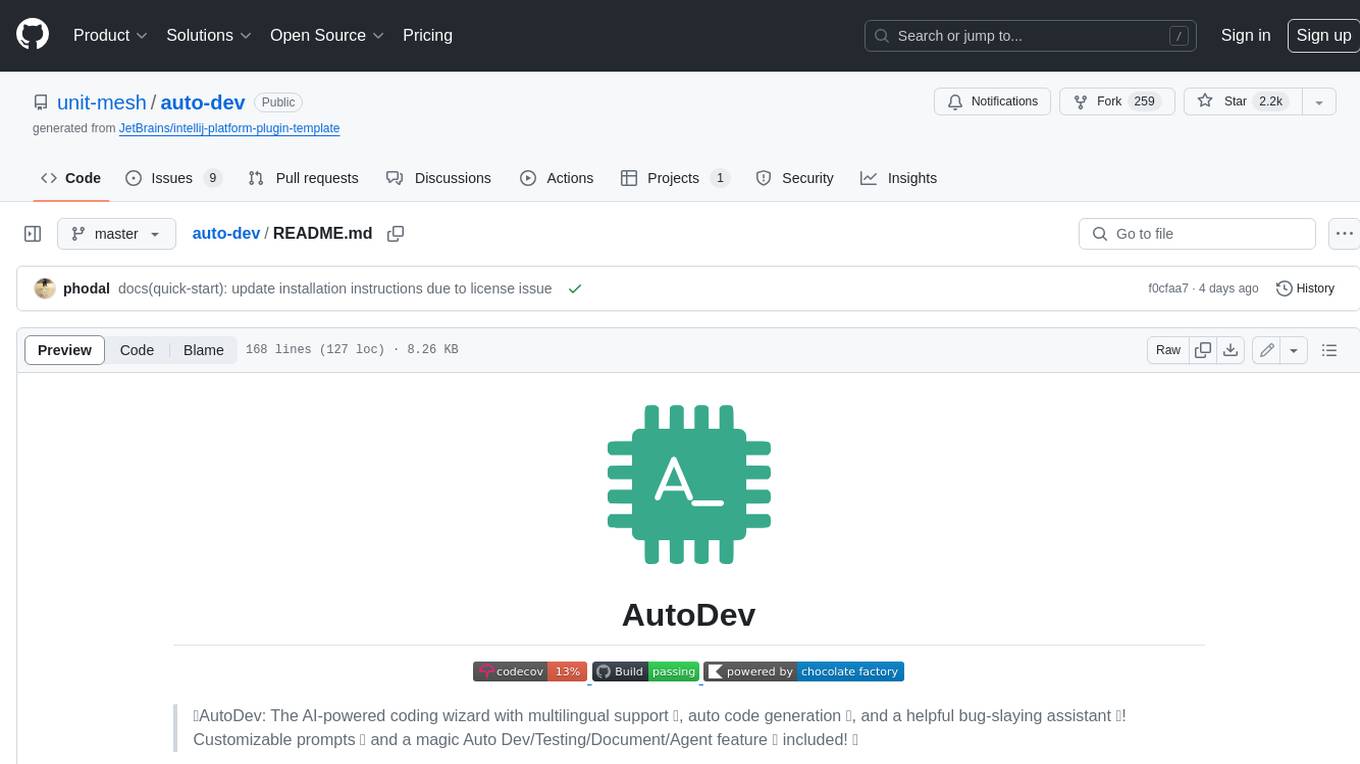
auto-dev
AutoDev is an AI-powered coding wizard that supports multiple languages, including Java, Kotlin, JavaScript/TypeScript, Rust, Python, Golang, C/C++/OC, and more. It offers a range of features, including auto development mode, copilot mode, chat with AI, customization options, SDLC support, custom AI agent integration, and language features such as language support, extensions, and a DevIns language for AI agent development. AutoDev is designed to assist developers with tasks such as auto code generation, bug detection, code explanation, exception tracing, commit message generation, code review content generation, smart refactoring, Dockerfile generation, CI/CD config file generation, and custom shell/command generation. It also provides a built-in LLM fine-tune model and supports UnitEval for LLM result evaluation and UnitGen for code-LLM fine-tune data generation.
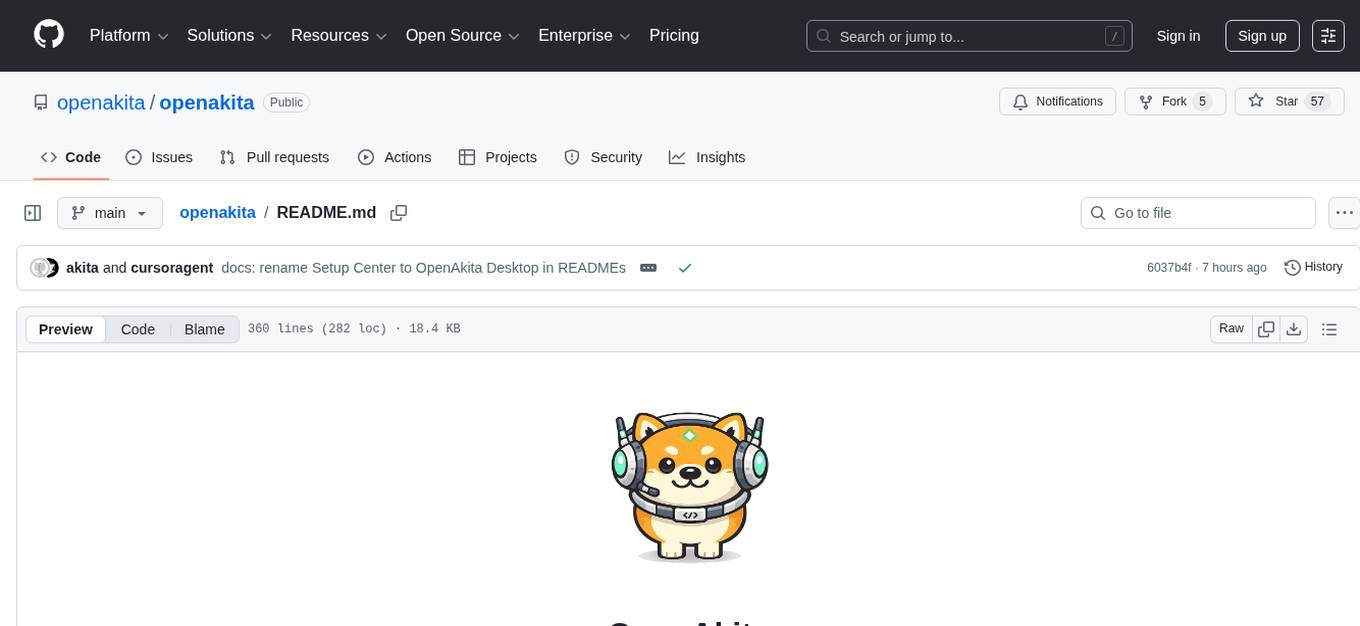
openakita
OpenAkita is a self-evolving AI Agent framework that autonomously learns new skills, performs daily self-checks and repairs, accumulates experience from task execution, and persists until the task is done. It auto-generates skills, installs dependencies, learns from mistakes, and remembers preferences. The framework is standards-based, multi-platform, and provides a Setup Center GUI for intuitive installation and configuration. It features self-learning and evolution mechanisms, a Ralph Wiggum Mode for persistent execution, multi-LLM endpoints, multi-platform IM support, desktop automation, multi-agent architecture, scheduled tasks, identity and memory management, a tool system, and a guided wizard for setup.
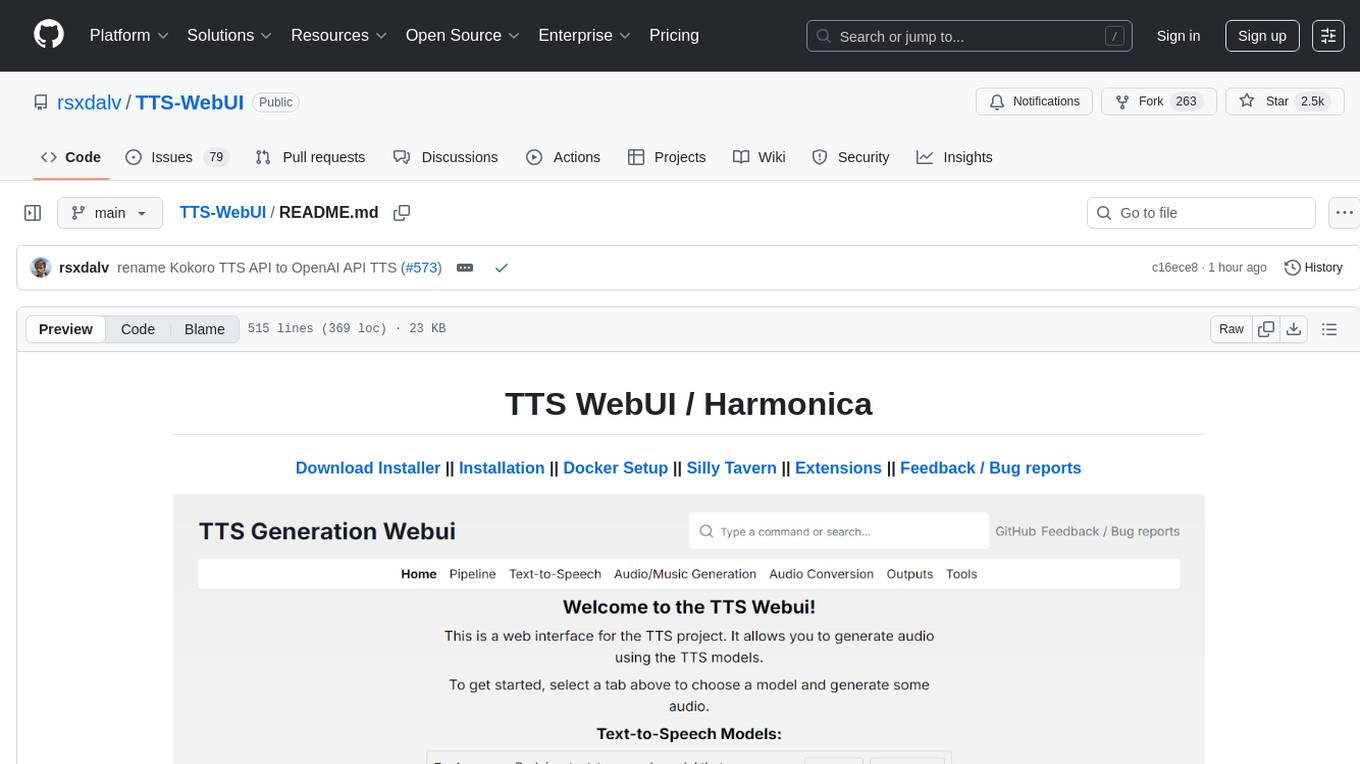
TTS-WebUI
TTS WebUI is a comprehensive tool for text-to-speech synthesis, audio/music generation, and audio conversion. It offers a user-friendly interface for various AI projects related to voice and audio processing. The tool provides a range of models and extensions for different tasks, along with integrations like Silly Tavern and OpenWebUI. With support for Docker setup and compatibility with Linux and Windows, TTS WebUI aims to facilitate creative and responsible use of AI technologies in a user-friendly manner.
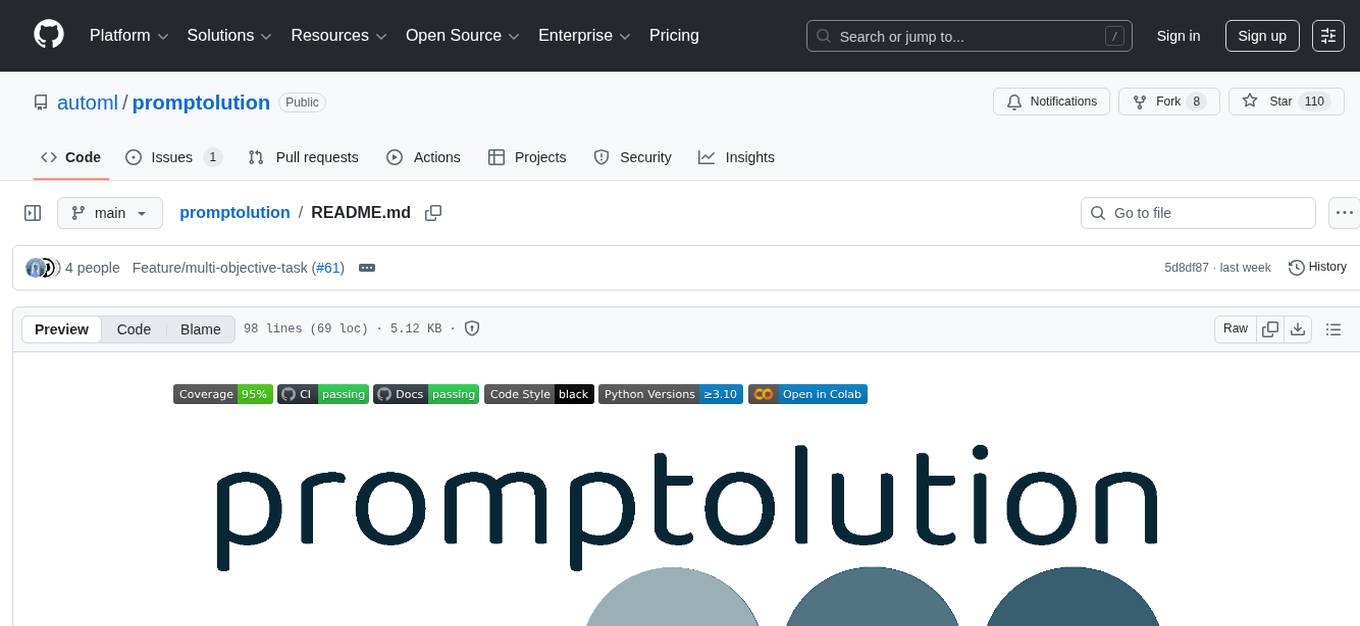
promptolution
Promptolution is a unified, modular framework for prompt optimization designed for researchers and advanced practitioners. It focuses on the optimization stage, providing a clean, transparent, and extensible API for simple prompt optimization for various tasks. It supports many current prompt optimizers, unified LLM backend, response caching, parallelized inference, and detailed logging for post-hoc analysis.
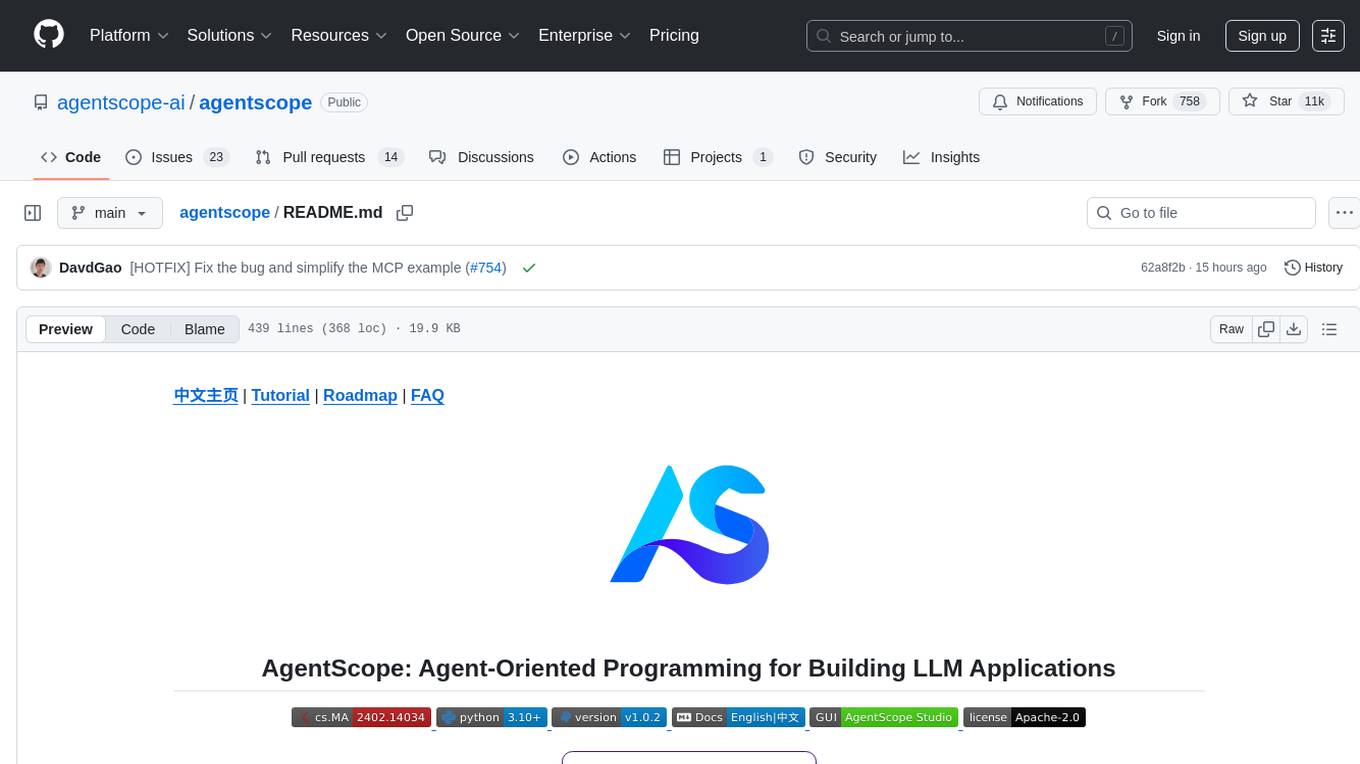
agentscope
AgentScope is an agent-oriented programming tool for building LLM (Large Language Model) applications. It provides transparent development, realtime steering, agentic tools management, model agnostic programming, LEGO-style agent building, multi-agent support, and high customizability. The tool supports async invocation, reasoning models, streaming returns, async/sync tool functions, user interruption, group-wise tools management, streamable transport, stateful/stateless mode MCP client, distributed and parallel evaluation, multi-agent conversation management, and fine-grained MCP control. AgentScope Studio enables tracing and visualization of agent applications. The tool is highly customizable and encourages customization at various levels.
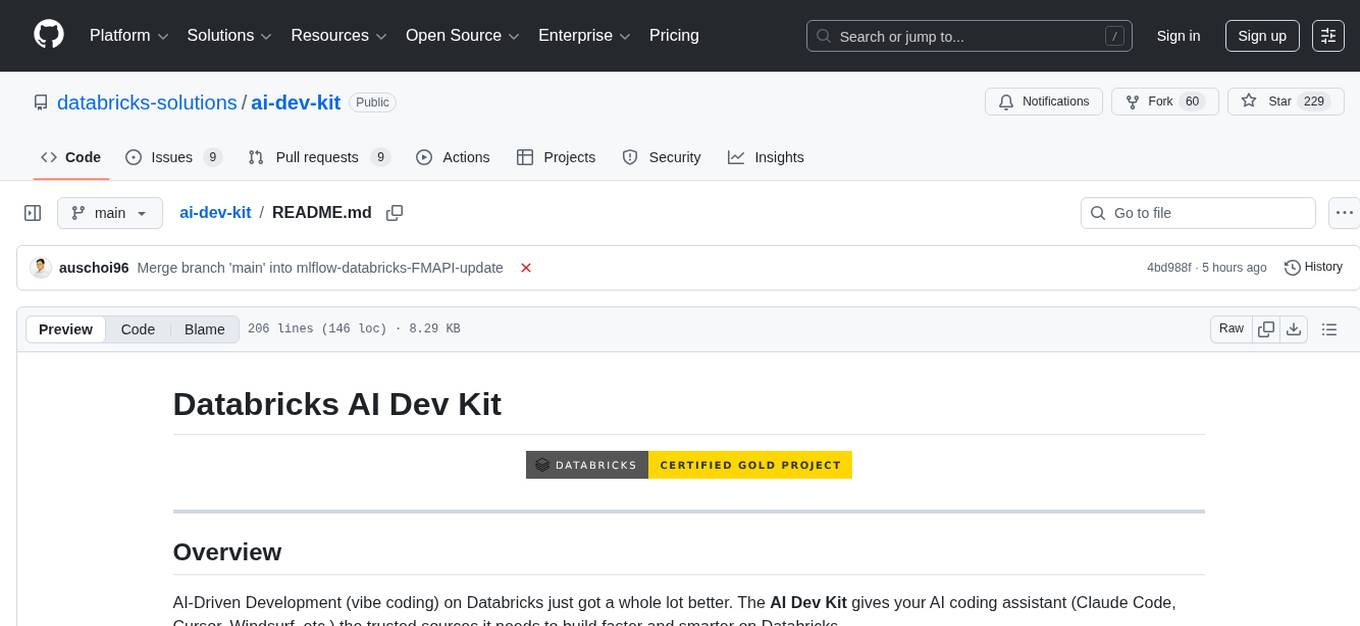
ai-dev-kit
The AI Dev Kit is a comprehensive toolkit designed to enhance AI-driven development on Databricks. It provides trusted sources for AI coding assistants like Claude Code and Cursor to build faster and smarter on Databricks. The kit includes features such as Spark Declarative Pipelines, Databricks Jobs, AI/BI Dashboards, Unity Catalog, Genie Spaces, Knowledge Assistants, MLflow Experiments, Model Serving, Databricks Apps, and more. Users can choose from different adventures like installing the kit, using the visual builder app, teaching AI assistants Databricks patterns, executing Databricks actions, or building custom integrations with the core library. The kit also includes components like databricks-tools-core, databricks-mcp-server, databricks-skills, databricks-builder-app, and ai-dev-project.
For similar tasks

lollms-webui
LoLLMs WebUI (Lord of Large Language Multimodal Systems: One tool to rule them all) is a user-friendly interface to access and utilize various LLM (Large Language Models) and other AI models for a wide range of tasks. With over 500 AI expert conditionings across diverse domains and more than 2500 fine tuned models over multiple domains, LoLLMs WebUI provides an immediate resource for any problem, from car repair to coding assistance, legal matters, medical diagnosis, entertainment, and more. The easy-to-use UI with light and dark mode options, integration with GitHub repository, support for different personalities, and features like thumb up/down rating, copy, edit, and remove messages, local database storage, search, export, and delete multiple discussions, make LoLLMs WebUI a powerful and versatile tool.

daily-poetry-image
Daily Chinese ancient poetry and AI-generated images powered by Bing DALL-E-3. GitHub Action triggers the process automatically. Poetry is provided by Today's Poem API. The website is built with Astro.
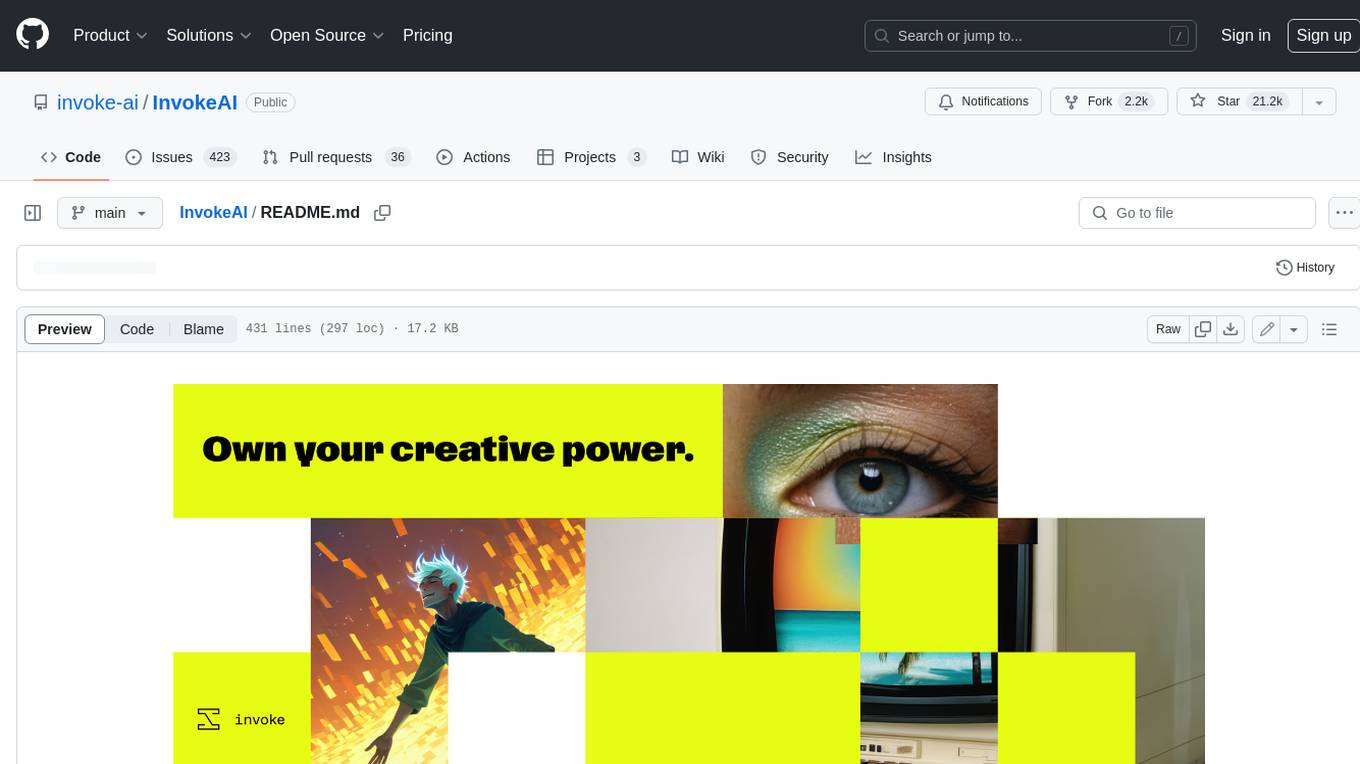
InvokeAI
InvokeAI is a leading creative engine built to empower professionals and enthusiasts alike. Generate and create stunning visual media using the latest AI-driven technologies. InvokeAI offers an industry leading Web Interface, interactive Command Line Interface, and also serves as the foundation for multiple commercial products.

LocalAI
LocalAI is a free and open-source OpenAI alternative that acts as a drop-in replacement REST API compatible with OpenAI (Elevenlabs, Anthropic, etc.) API specifications for local AI inferencing. It allows users to run LLMs, generate images, audio, and more locally or on-premises with consumer-grade hardware, supporting multiple model families and not requiring a GPU. LocalAI offers features such as text generation with GPTs, text-to-audio, audio-to-text transcription, image generation with stable diffusion, OpenAI functions, embeddings generation for vector databases, constrained grammars, downloading models directly from Huggingface, and a Vision API. It provides a detailed step-by-step introduction in its Getting Started guide and supports community integrations such as custom containers, WebUIs, model galleries, and various bots for Discord, Slack, and Telegram. LocalAI also offers resources like an LLM fine-tuning guide, instructions for local building and Kubernetes installation, projects integrating LocalAI, and a how-tos section curated by the community. It encourages users to cite the repository when utilizing it in downstream projects and acknowledges the contributions of various software from the community.

classifai
Supercharge WordPress Content Workflows and Engagement with Artificial Intelligence. Tap into leading cloud-based services like OpenAI, Microsoft Azure AI, Google Gemini and IBM Watson to augment your WordPress-powered websites. Publish content faster while improving SEO performance and increasing audience engagement. ClassifAI integrates Artificial Intelligence and Machine Learning technologies to lighten your workload and eliminate tedious tasks, giving you more time to create original content that matters.
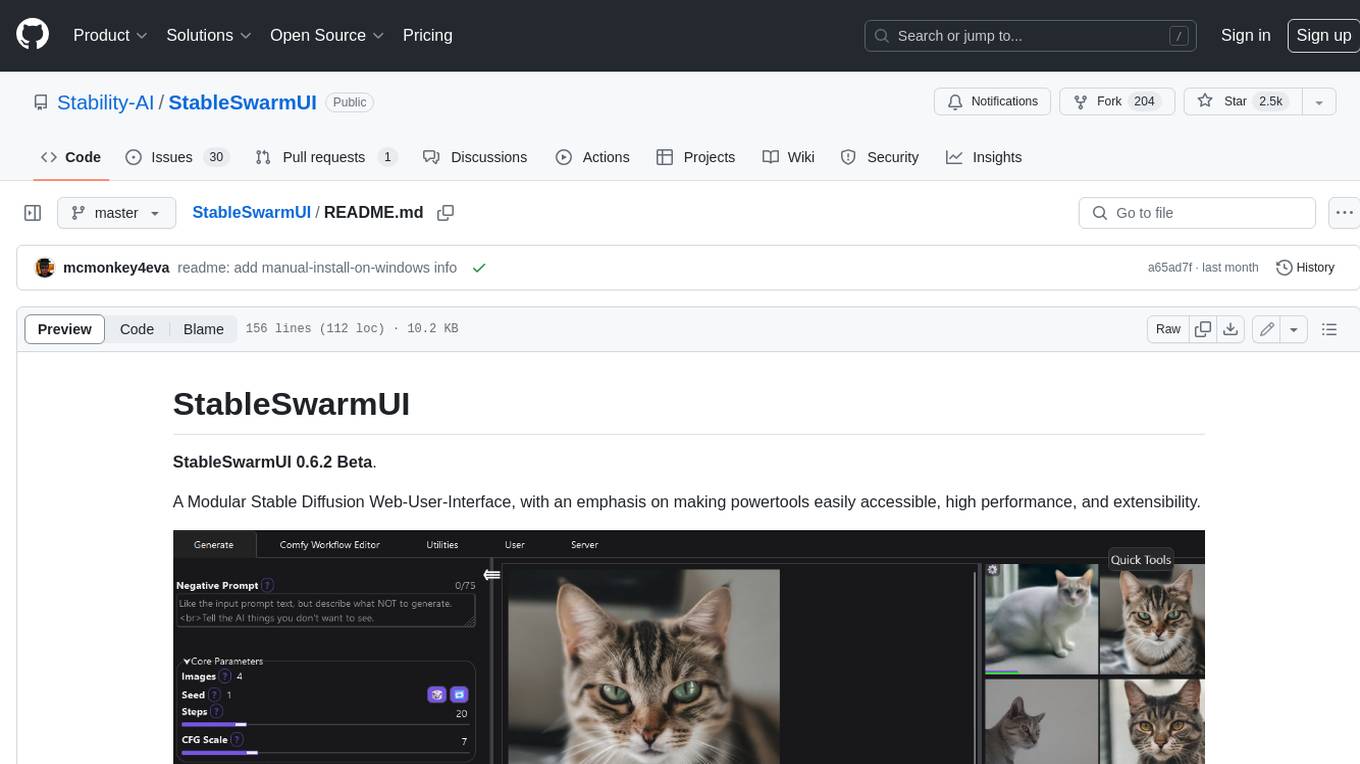
StableSwarmUI
StableSwarmUI is a modular Stable Diffusion web user interface that emphasizes making power tools easily accessible, high performance, and extensible. It is designed to be a one-stop-shop for all things Stable Diffusion, providing a wide range of features and capabilities to enhance the user experience.
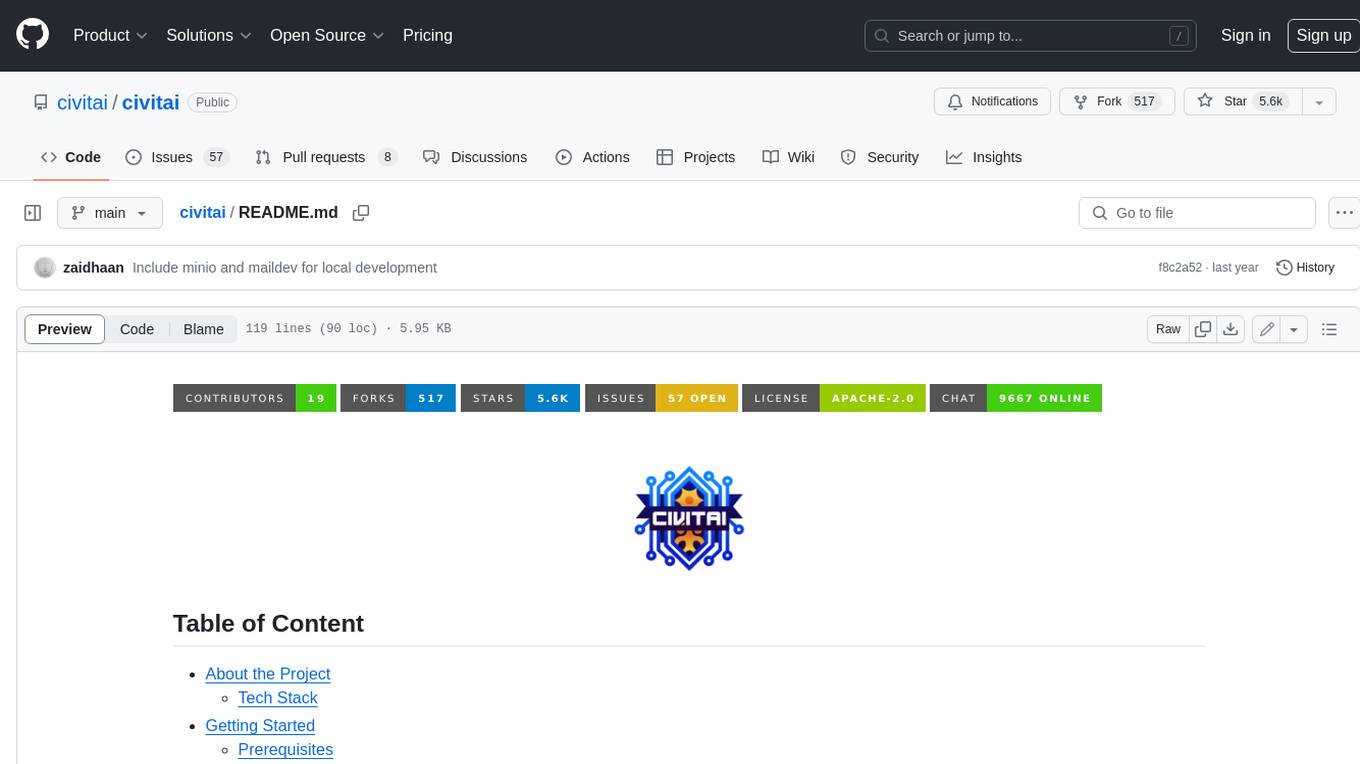
civitai
Civitai is a platform where people can share their stable diffusion models (textual inversions, hypernetworks, aesthetic gradients, VAEs, and any other crazy stuff people do to customize their AI generations), collaborate with others to improve them, and learn from each other's work. The platform allows users to create an account, upload their models, and browse models that have been shared by others. Users can also leave comments and feedback on each other's models to facilitate collaboration and knowledge sharing.
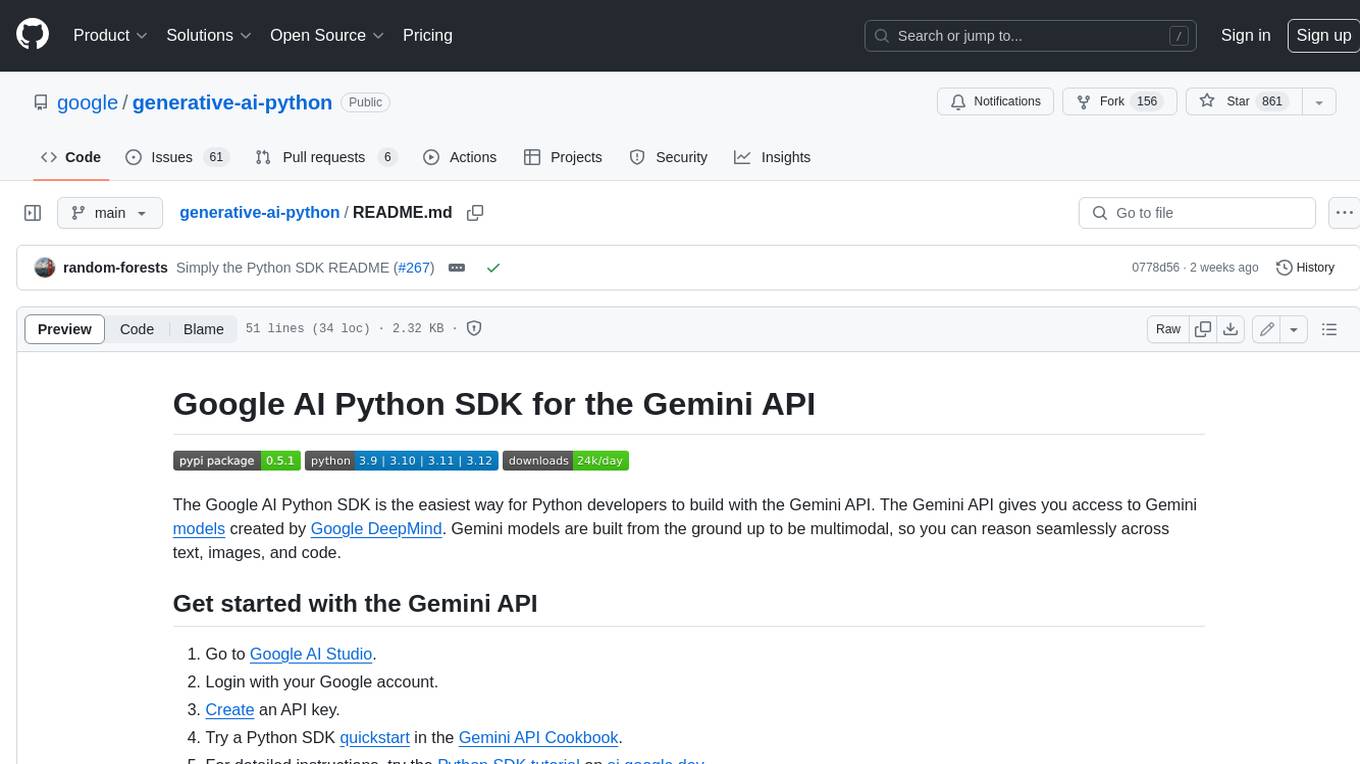
generative-ai-python
The Google AI Python SDK is the easiest way for Python developers to build with the Gemini API. The Gemini API gives you access to Gemini models created by Google DeepMind. Gemini models are built from the ground up to be multimodal, so you can reason seamlessly across text, images, and code.
For similar jobs

LocalAI
LocalAI is a free and open-source OpenAI alternative that acts as a drop-in replacement REST API compatible with OpenAI (Elevenlabs, Anthropic, etc.) API specifications for local AI inferencing. It allows users to run LLMs, generate images, audio, and more locally or on-premises with consumer-grade hardware, supporting multiple model families and not requiring a GPU. LocalAI offers features such as text generation with GPTs, text-to-audio, audio-to-text transcription, image generation with stable diffusion, OpenAI functions, embeddings generation for vector databases, constrained grammars, downloading models directly from Huggingface, and a Vision API. It provides a detailed step-by-step introduction in its Getting Started guide and supports community integrations such as custom containers, WebUIs, model galleries, and various bots for Discord, Slack, and Telegram. LocalAI also offers resources like an LLM fine-tuning guide, instructions for local building and Kubernetes installation, projects integrating LocalAI, and a how-tos section curated by the community. It encourages users to cite the repository when utilizing it in downstream projects and acknowledges the contributions of various software from the community.
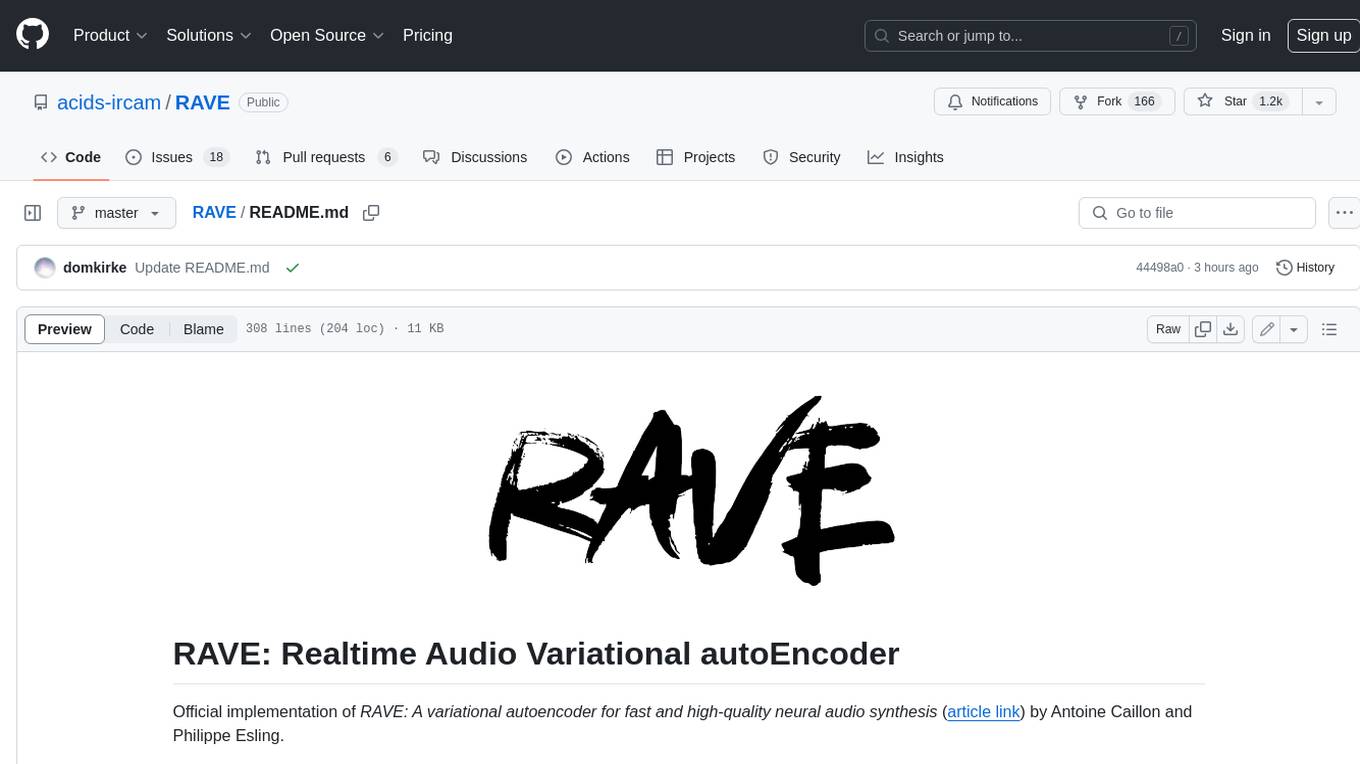
RAVE
RAVE is a variational autoencoder for fast and high-quality neural audio synthesis. It can be used to generate new audio samples from a given dataset, or to modify the style of existing audio samples. RAVE is easy to use and can be trained on a variety of audio datasets. It is also computationally efficient, making it suitable for real-time applications.
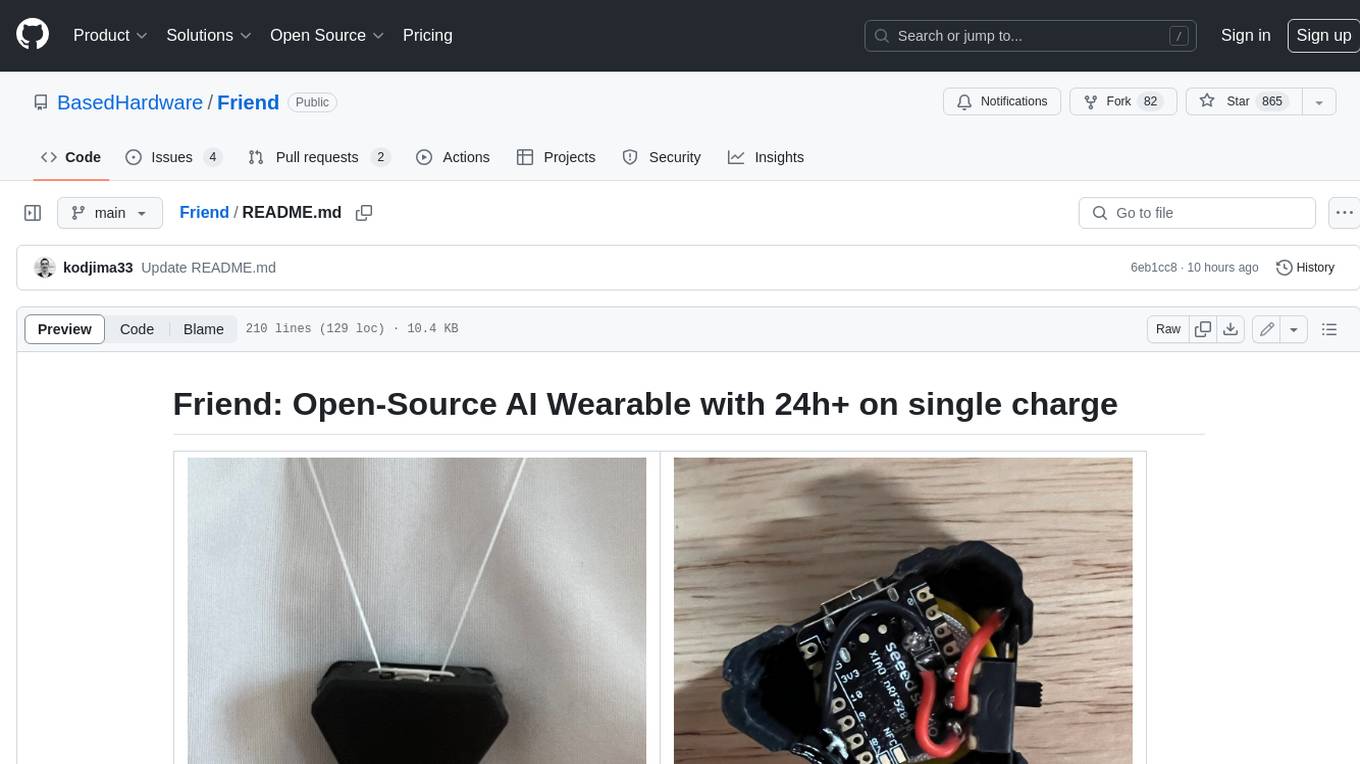
Friend
Friend is an open-source AI wearable device that records everything you say, gives you proactive feedback and advice. It has real-time AI audio processing capabilities, low-powered Bluetooth, open-source software, and a wearable design. The device is designed to be affordable and easy to use, with a total cost of less than $20. To get started, you can clone the repo, choose the version of the app you want to install, and follow the instructions for installing the firmware and assembling the device. Friend is still a prototype project and is provided "as is", without warranty of any kind. Use of the device should comply with all local laws and regulations concerning privacy and data protection.

h2ogpt
h2oGPT is an Apache V2 open-source project that allows users to query and summarize documents or chat with local private GPT LLMs. It features a private offline database of any documents (PDFs, Excel, Word, Images, Video Frames, Youtube, Audio, Code, Text, MarkDown, etc.), a persistent database (Chroma, Weaviate, or in-memory FAISS) using accurate embeddings (instructor-large, all-MiniLM-L6-v2, etc.), and efficient use of context using instruct-tuned LLMs (no need for LangChain's few-shot approach). h2oGPT also offers parallel summarization and extraction, reaching an output of 80 tokens per second with the 13B LLaMa2 model, HYDE (Hypothetical Document Embeddings) for enhanced retrieval based upon LLM responses, a variety of models supported (LLaMa2, Mistral, Falcon, Vicuna, WizardLM. With AutoGPTQ, 4-bit/8-bit, LORA, etc.), GPU support from HF and LLaMa.cpp GGML models, and CPU support using HF, LLaMa.cpp, and GPT4ALL models. Additionally, h2oGPT provides Attention Sinks for arbitrarily long generation (LLaMa-2, Mistral, MPT, Pythia, Falcon, etc.), a UI or CLI with streaming of all models, the ability to upload and view documents through the UI (control multiple collaborative or personal collections), Vision Models LLaVa, Claude-3, Gemini-Pro-Vision, GPT-4-Vision, Image Generation Stable Diffusion (sdxl-turbo, sdxl) and PlaygroundAI (playv2), Voice STT using Whisper with streaming audio conversion, Voice TTS using MIT-Licensed Microsoft Speech T5 with multiple voices and Streaming audio conversion, Voice TTS using MPL2-Licensed TTS including Voice Cloning and Streaming audio conversion, AI Assistant Voice Control Mode for hands-free control of h2oGPT chat, Bake-off UI mode against many models at the same time, Easy Download of model artifacts and control over models like LLaMa.cpp through the UI, Authentication in the UI by user/password via Native or Google OAuth, State Preservation in the UI by user/password, Linux, Docker, macOS, and Windows support, Easy Windows Installer for Windows 10 64-bit (CPU/CUDA), Easy macOS Installer for macOS (CPU/M1/M2), Inference Servers support (oLLaMa, HF TGI server, vLLM, Gradio, ExLLaMa, Replicate, OpenAI, Azure OpenAI, Anthropic), OpenAI-compliant, Server Proxy API (h2oGPT acts as drop-in-replacement to OpenAI server), Python client API (to talk to Gradio server), JSON Mode with any model via code block extraction. Also supports MistralAI JSON mode, Claude-3 via function calling with strict Schema, OpenAI via JSON mode, and vLLM via guided_json with strict Schema, Web-Search integration with Chat and Document Q/A, Agents for Search, Document Q/A, Python Code, CSV frames (Experimental, best with OpenAI currently), Evaluate performance using reward models, and Quality maintained with over 1000 unit and integration tests taking over 4 GPU-hours.

StableSwarmUI
StableSwarmUI is a modular Stable Diffusion web user interface that emphasizes making power tools easily accessible, high performance, and extensible. It is designed to be a one-stop-shop for all things Stable Diffusion, providing a wide range of features and capabilities to enhance the user experience.

civitai
Civitai is a platform where people can share their stable diffusion models (textual inversions, hypernetworks, aesthetic gradients, VAEs, and any other crazy stuff people do to customize their AI generations), collaborate with others to improve them, and learn from each other's work. The platform allows users to create an account, upload their models, and browse models that have been shared by others. Users can also leave comments and feedback on each other's models to facilitate collaboration and knowledge sharing.
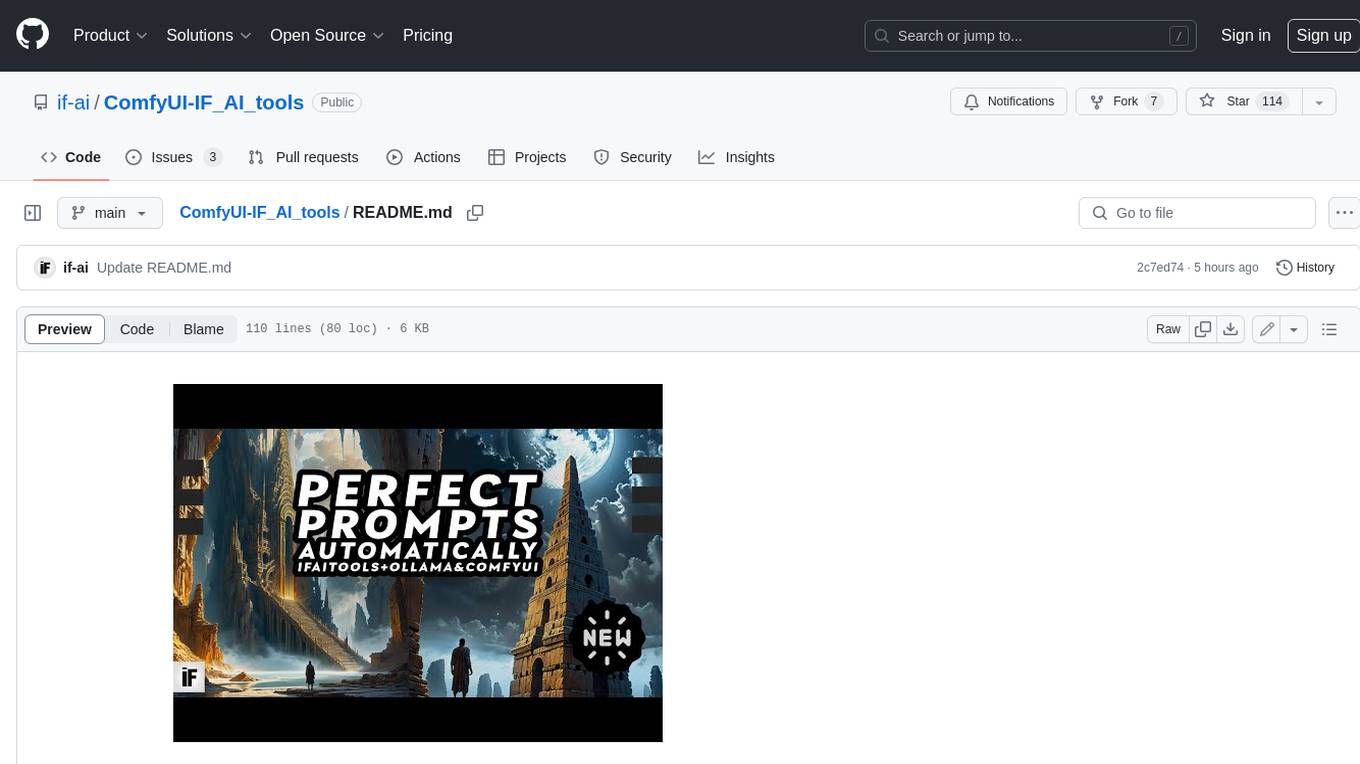
ComfyUI-IF_AI_tools
ComfyUI-IF_AI_tools is a set of custom nodes for ComfyUI that allows you to generate prompts using a local Large Language Model (LLM) via Ollama. This tool enables you to enhance your image generation workflow by leveraging the power of language models.

intel-extension-for-transformers
Intel® Extension for Transformers is an innovative toolkit designed to accelerate GenAI/LLM everywhere with the optimal performance of Transformer-based models on various Intel platforms, including Intel Gaudi2, Intel CPU, and Intel GPU. The toolkit provides the below key features and examples: * Seamless user experience of model compressions on Transformer-based models by extending [Hugging Face transformers](https://github.com/huggingface/transformers) APIs and leveraging [Intel® Neural Compressor](https://github.com/intel/neural-compressor) * Advanced software optimizations and unique compression-aware runtime (released with NeurIPS 2022's paper [Fast Distilbert on CPUs](https://arxiv.org/abs/2211.07715) and [QuaLA-MiniLM: a Quantized Length Adaptive MiniLM](https://arxiv.org/abs/2210.17114), and NeurIPS 2021's paper [Prune Once for All: Sparse Pre-Trained Language Models](https://arxiv.org/abs/2111.05754)) * Optimized Transformer-based model packages such as [Stable Diffusion](examples/huggingface/pytorch/text-to-image/deployment/stable_diffusion), [GPT-J-6B](examples/huggingface/pytorch/text-generation/deployment), [GPT-NEOX](examples/huggingface/pytorch/language-modeling/quantization#2-validated-model-list), [BLOOM-176B](examples/huggingface/pytorch/language-modeling/inference#BLOOM-176B), [T5](examples/huggingface/pytorch/summarization/quantization#2-validated-model-list), [Flan-T5](examples/huggingface/pytorch/summarization/quantization#2-validated-model-list), and end-to-end workflows such as [SetFit-based text classification](docs/tutorials/pytorch/text-classification/SetFit_model_compression_AGNews.ipynb) and [document level sentiment analysis (DLSA)](workflows/dlsa) * [NeuralChat](intel_extension_for_transformers/neural_chat), a customizable chatbot framework to create your own chatbot within minutes by leveraging a rich set of [plugins](https://github.com/intel/intel-extension-for-transformers/blob/main/intel_extension_for_transformers/neural_chat/docs/advanced_features.md) such as [Knowledge Retrieval](./intel_extension_for_transformers/neural_chat/pipeline/plugins/retrieval/README.md), [Speech Interaction](./intel_extension_for_transformers/neural_chat/pipeline/plugins/audio/README.md), [Query Caching](./intel_extension_for_transformers/neural_chat/pipeline/plugins/caching/README.md), and [Security Guardrail](./intel_extension_for_transformers/neural_chat/pipeline/plugins/security/README.md). This framework supports Intel Gaudi2/CPU/GPU. * [Inference](https://github.com/intel/neural-speed/tree/main) of Large Language Model (LLM) in pure C/C++ with weight-only quantization kernels for Intel CPU and Intel GPU (TBD), supporting [GPT-NEOX](https://github.com/intel/neural-speed/tree/main/neural_speed/models/gptneox), [LLAMA](https://github.com/intel/neural-speed/tree/main/neural_speed/models/llama), [MPT](https://github.com/intel/neural-speed/tree/main/neural_speed/models/mpt), [FALCON](https://github.com/intel/neural-speed/tree/main/neural_speed/models/falcon), [BLOOM-7B](https://github.com/intel/neural-speed/tree/main/neural_speed/models/bloom), [OPT](https://github.com/intel/neural-speed/tree/main/neural_speed/models/opt), [ChatGLM2-6B](https://github.com/intel/neural-speed/tree/main/neural_speed/models/chatglm), [GPT-J-6B](https://github.com/intel/neural-speed/tree/main/neural_speed/models/gptj), and [Dolly-v2-3B](https://github.com/intel/neural-speed/tree/main/neural_speed/models/gptneox). Support AMX, VNNI, AVX512F and AVX2 instruction set. We've boosted the performance of Intel CPUs, with a particular focus on the 4th generation Intel Xeon Scalable processor, codenamed [Sapphire Rapids](https://www.intel.com/content/www/us/en/products/docs/processors/xeon-accelerated/4th-gen-xeon-scalable-processors.html).











